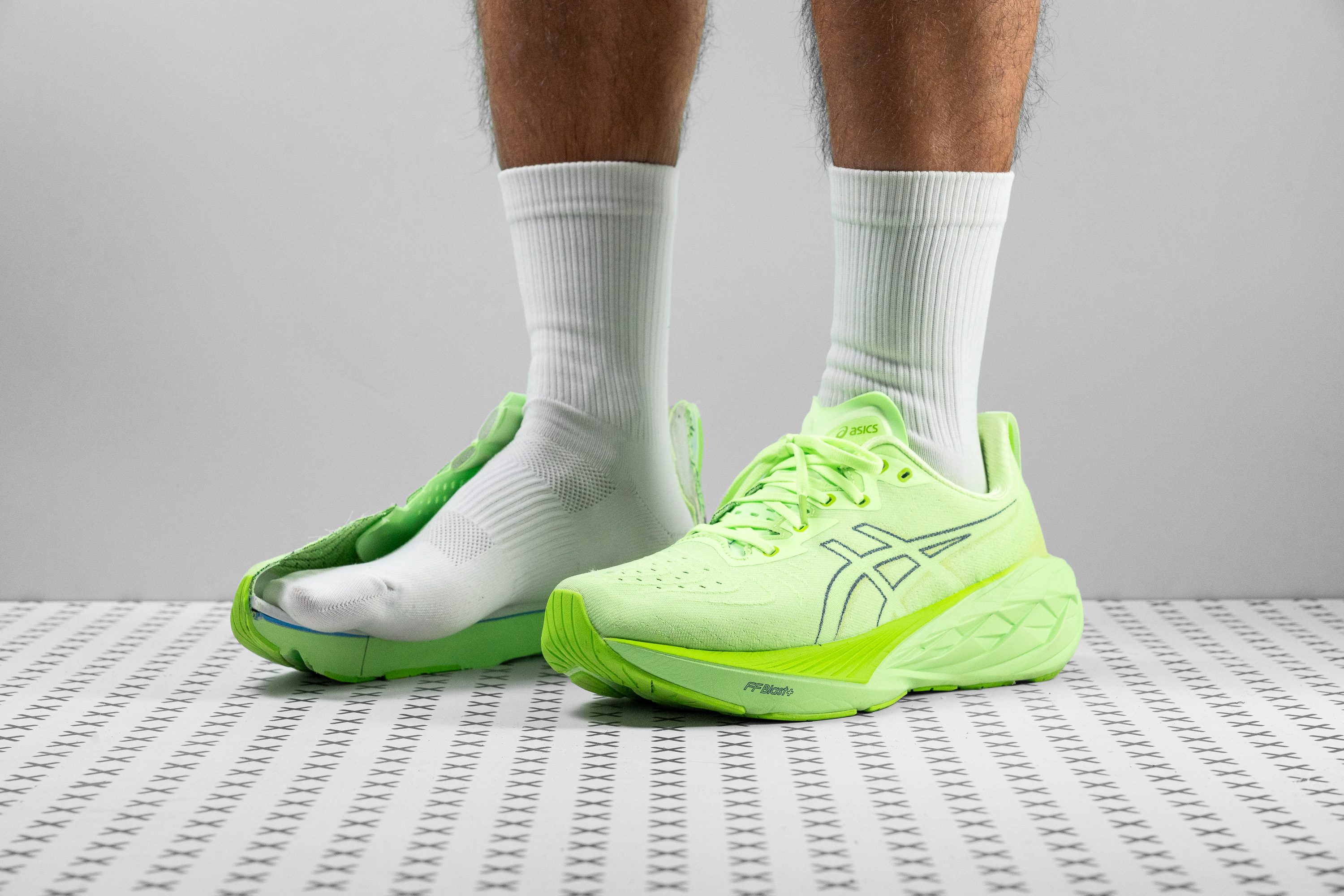Our verdict
- Top pick in best treadmill running shoes (2024)
- Top pick in best cushioned running shoes (2024)
Pros
- Enhanced outsole offering better grip and durability
- Improved upper comfort with premium materials
- Upgraded tongue padding
- Exceptional value at just $140
- More cushion than ever before
- Accommodates a wide range of foot sizes
- The most stable Novablast yet
Cons
- Not the best for hot summer runs
- Minor weight increase compared to v3
Audience verdict
- Top 3% in road running shoes
- Top 7% in ASICS running shoes
- Top 15% most popular running shoes
Comparison
The most similar running shoes compared
+ + Add a shoe | |||||
|---|---|---|---|---|---|
| Audience score | 92 Superb! | 92 Superb! | 89 Great! | 90 Superb! | |
| Price | $140 | $150 | $130 | $200 | |
| Pace | Daily running | Daily runningTempo | Daily running | Daily runningTempo | |
| Shock absorption | High | High | High | Moderate | |
| Energy return | Moderate | Moderate | Low | High | |
| Traction | High | High | Moderate | High | |
| Arch support | Neutral | Neutral | Neutral | Neutral | |
| Weight lab Weight brand | 9.1 oz / 259g 9 oz / 255g | 9 oz / 254g 9 oz / 255g | 9.7 oz / 274g 9.5 oz / 270g | 8.9 oz / 252g 8.8 oz / 250g | |
| Drop lab Drop brand | 9.0 mm 8.0 mm | 7.4 mm 8.0 mm | 10.5 mm 5.0 mm | 8.2 mm 8.0 mm | |
| Strike pattern | HeelMid/forefoot | Mid/forefoot | Heel | HeelMid/forefoot | |
| Size | True to size | True to size | True to size | True to size | |
| Midsole softness | Soft | Soft | Soft | Soft | |
| Difference in midsole softness in cold | Normal | Big | Normal | Small | |
| Toebox durability | Decent | Bad | Bad | Good | |
| Heel padding durability | Good | Decent | Decent | Good | |
| Outsole durability | Good | Good | Good | Good | |
| Breathability | Moderate | Moderate | Breathable | Breathable | |
| Width / fit | Narrow | Medium | Medium | Medium | |
| Toebox width | Medium | Medium | Medium | Medium | |
| Stiffness | Stiff | Moderate | Moderate | Stiff | |
| Torsional rigidity | Stiff | Stiff | Stiff | Stiff | |
| Heel counter stiffness | Moderate | Moderate | Stiff | Moderate | |
| Rocker | ✓ | ✓ | ✗ | ✓ | |
| Heel lab Heel brand | 39.2 mm 41.5 mm | 40.9 mm 41.5 mm | 40.7 mm 40.0 mm | 42.8 mm 45.0 mm | |
| Forefoot lab Forefoot brand | 30.2 mm 33.5 mm | 33.5 mm 33.5 mm | 30.2 mm 35.0 mm | 34.6 mm 37.0 mm | |
| Widths available | NormalWide | NormalWide | NormalWide | NormalWide | |
| Orthotic friendly | ✓ | ✓ | ✓ | ✓ | |
| Season | All seasons | All seasons | SummerAll seasons | SummerAll seasons | |
| Removable insole | ✓ | ✓ | ✓ | ✓ | |
| Ranking | #19 Top 3% | #15 Top 4% | #99 Top 26% | #78 Top 21% | |
| Popularity | #97 Top 15% | #7 Top 2% | #279 Bottom 27% | #25 Top 7% |
Who should buy
We believe the ASICS Novablast 4 is an ideal choice for:
- Beginners looking for a fun, comfy, all-around shoe at a reasonable price.
- Runners seeking a cushioned, lightweight option for their short or long runs.
- Anyone needing a versatile daily trainer that effortlessly adapts to both slow and moderately fast paces.
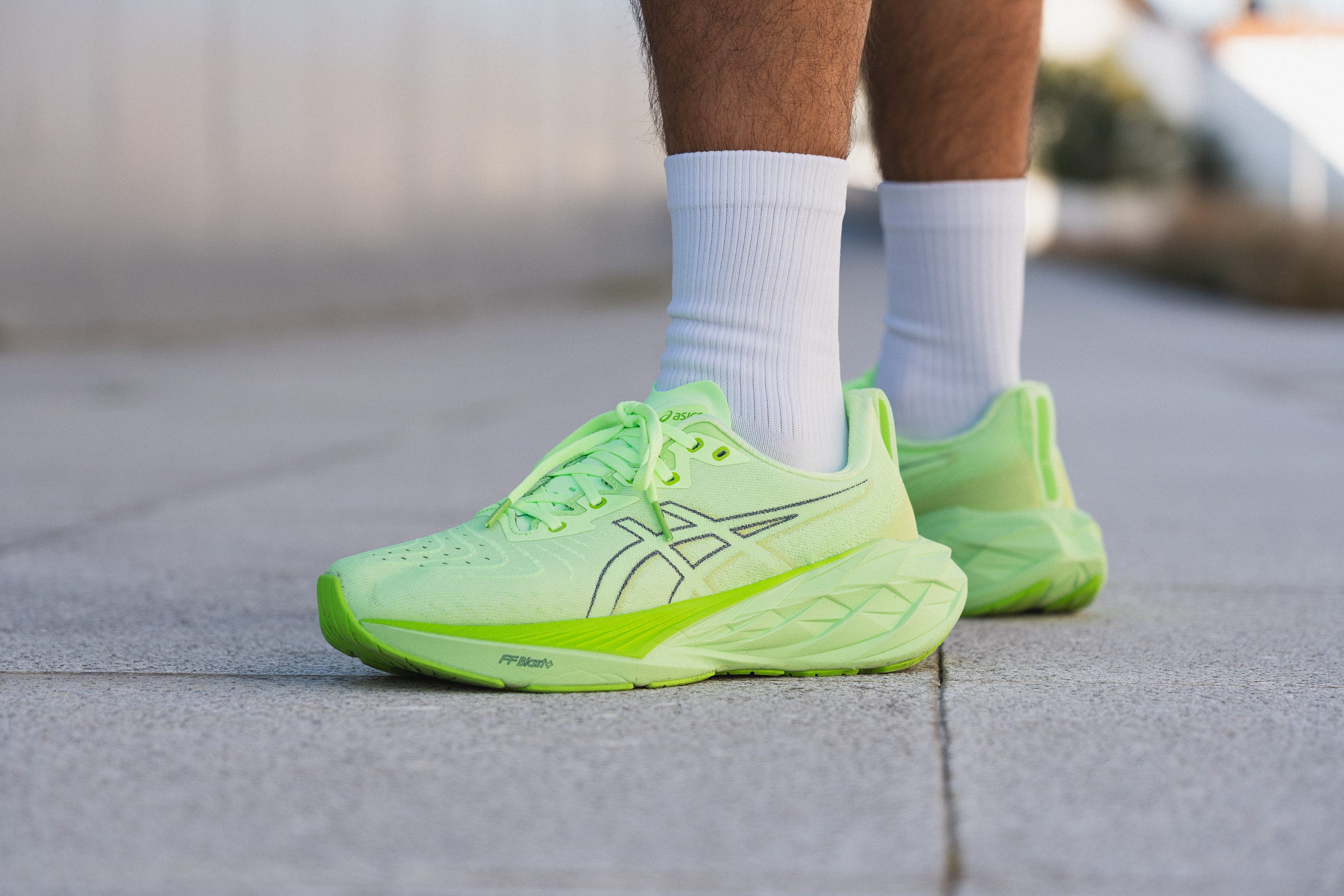
Who should NOT buy
Though the ASICS Novablast 4 offers substantial cushioning, we think it doesn't quite match the ASICS Superblast in energy return. If budget isn't a concern, the Superblast is the most responsive daily trainer you can buy today.
Based in our lab tests, the Novablast 4 also does fall slightly short in breathability, which might be a concern during the hottest days of the year.
For those who prioritize excellent airflow in their daily trainers, we recommend considering the ASICS Gel Kayano 30, the Saucony Triumph 21 or the ASICS Gel Cumulus 25.
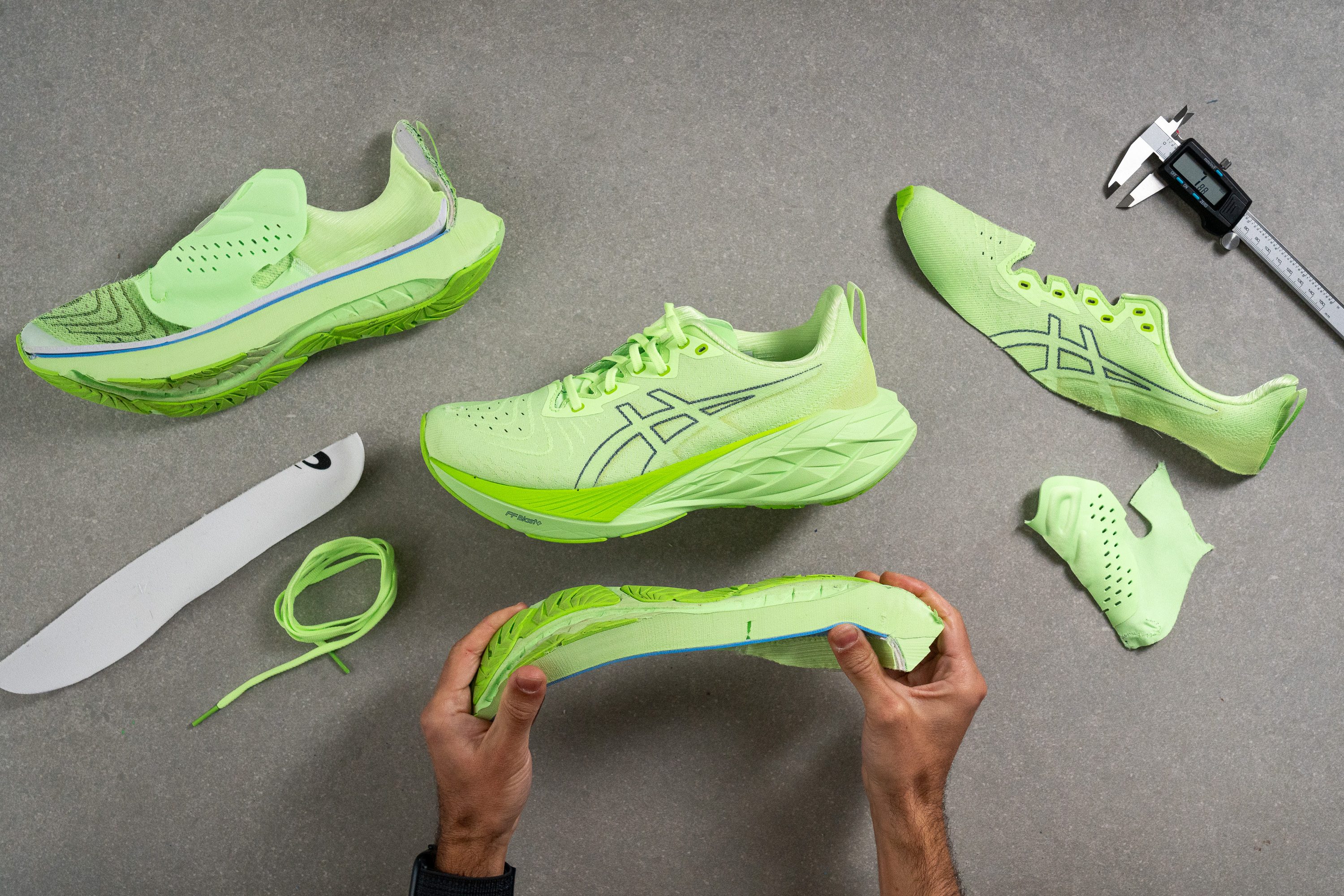
Cushioning
Shock absorption
Runners wanting to cushion every landing will feel right at home with the Novablast 4. It delivers strong shock absorption—scoring 134 SA in the heel and 124 in the forefoot. ASICS clearly designed this model with impact protection in mind, even making it a solid option for heavier runners.
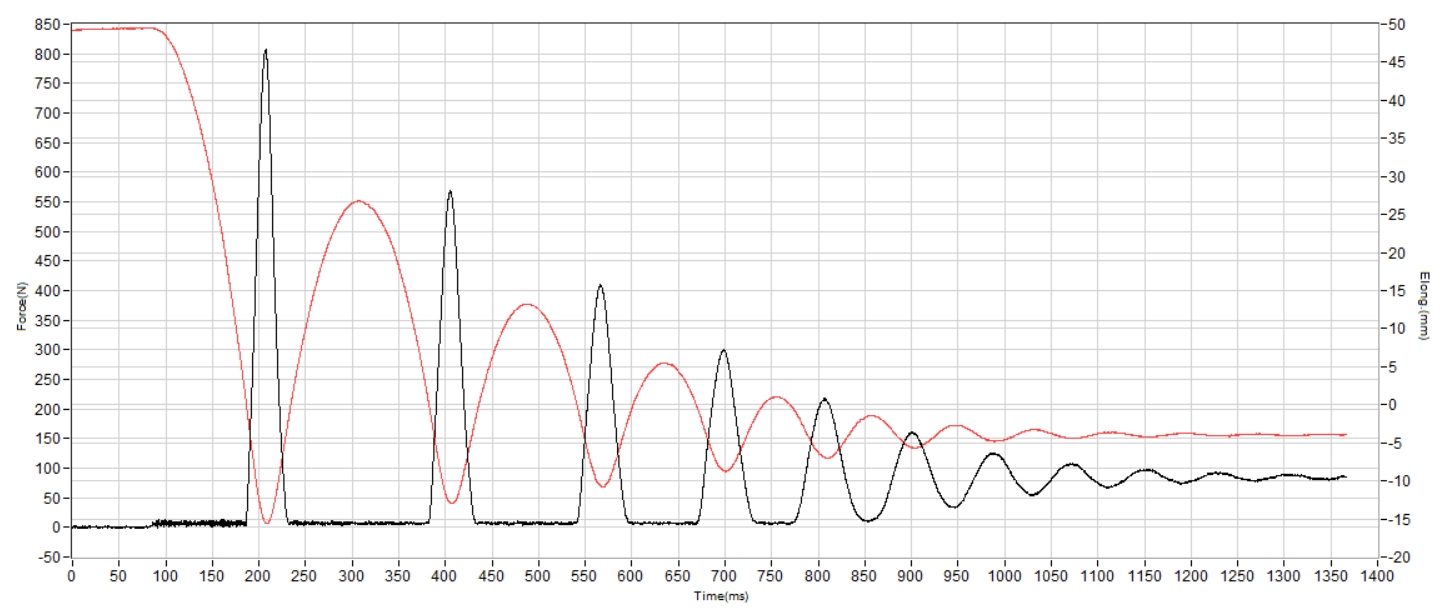
| Novablast 4 | 134 SA |
| Average | 130 SA |
Energy return
However, energy return left us wanting more. While it’s no surprise as FF Blast+ has often delivered below-average scores in our lab, the Novablast lineup needs to push past the 58.3% mark, which currently sits right around our lab average. It’s not a poor result, but we’re hoping for more bounce in version 5.
| Novablast 4 | 58.3% |
| Average | 58.6% |
Heel stack
We just noted that the Novablast 4 boasts more foam than its predecessor, but now it's time to verify ASICS' claims and measure its growth.
With a heel stack height of 39.2 mm, it's 2.0 mm more than last year's model. Keep in mind, though, that this increase isn't all foam, as we've already shown there's more rubber too.
Yet, the shoe undoubtedly feels more cushioned in the heel—a feature that rearfoot strikers will absolutely adore.
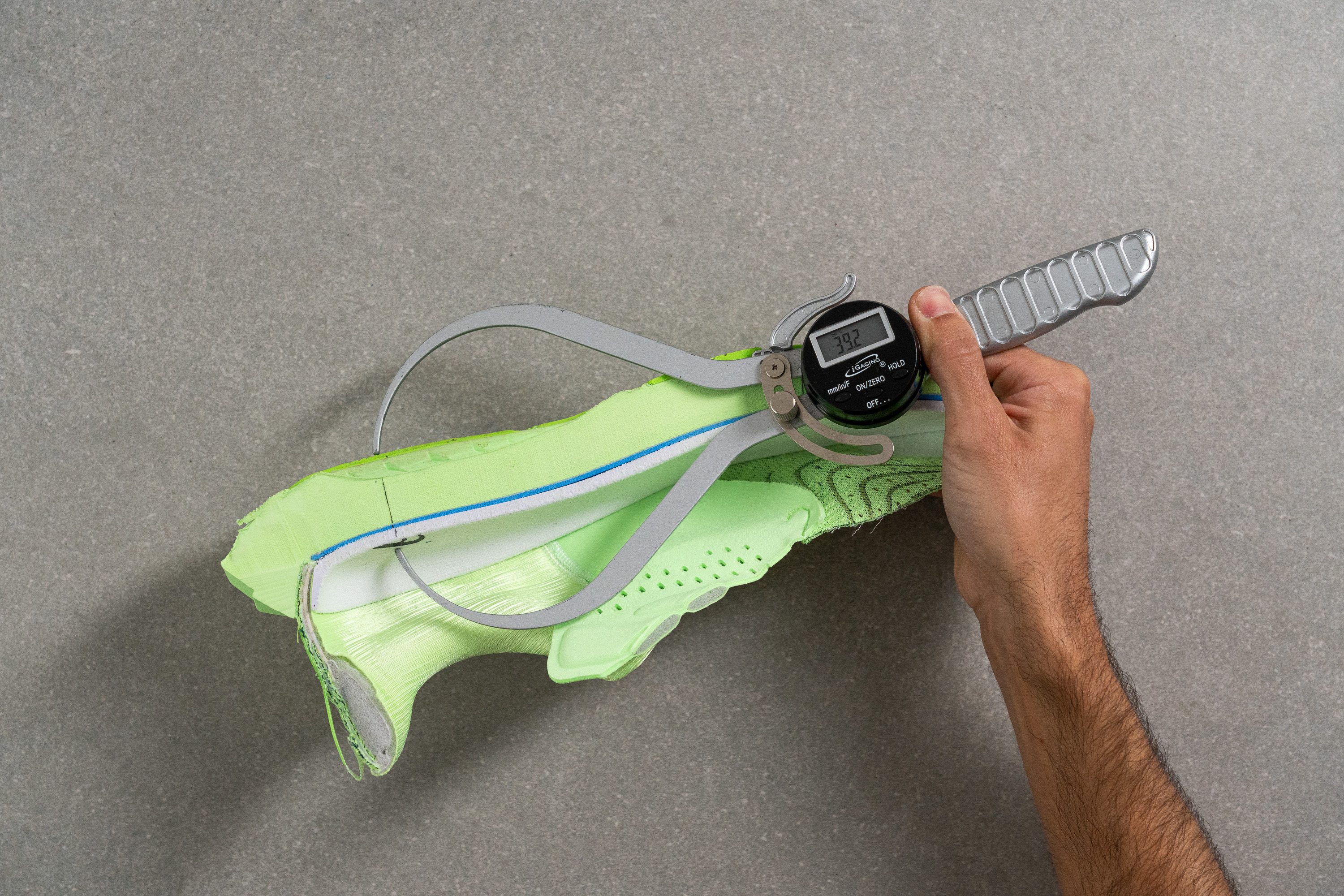
| Novablast 4 | 39.2 mm |
| Average | 34.8 mm |
Forefoot stack
In the forefoot, we measured a generous 30.2 mm, which is significantly above the average and places the Novablast 4 among the thickest shoes in the market.
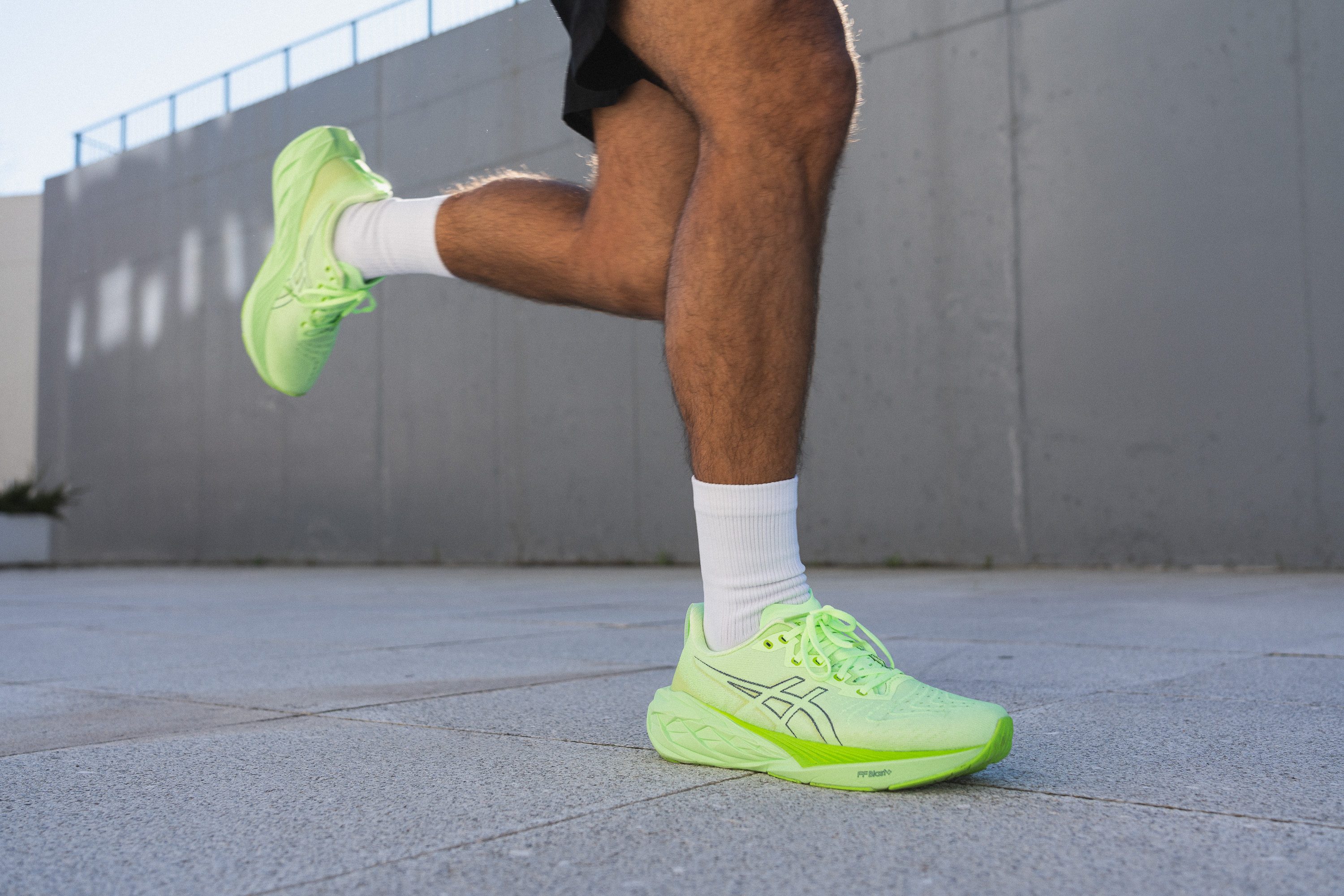
This makes it clear that cushioning is a standout feature of this shoe. We think all runners won't find themselves short on comfort underfoot, even during long 20-milers.
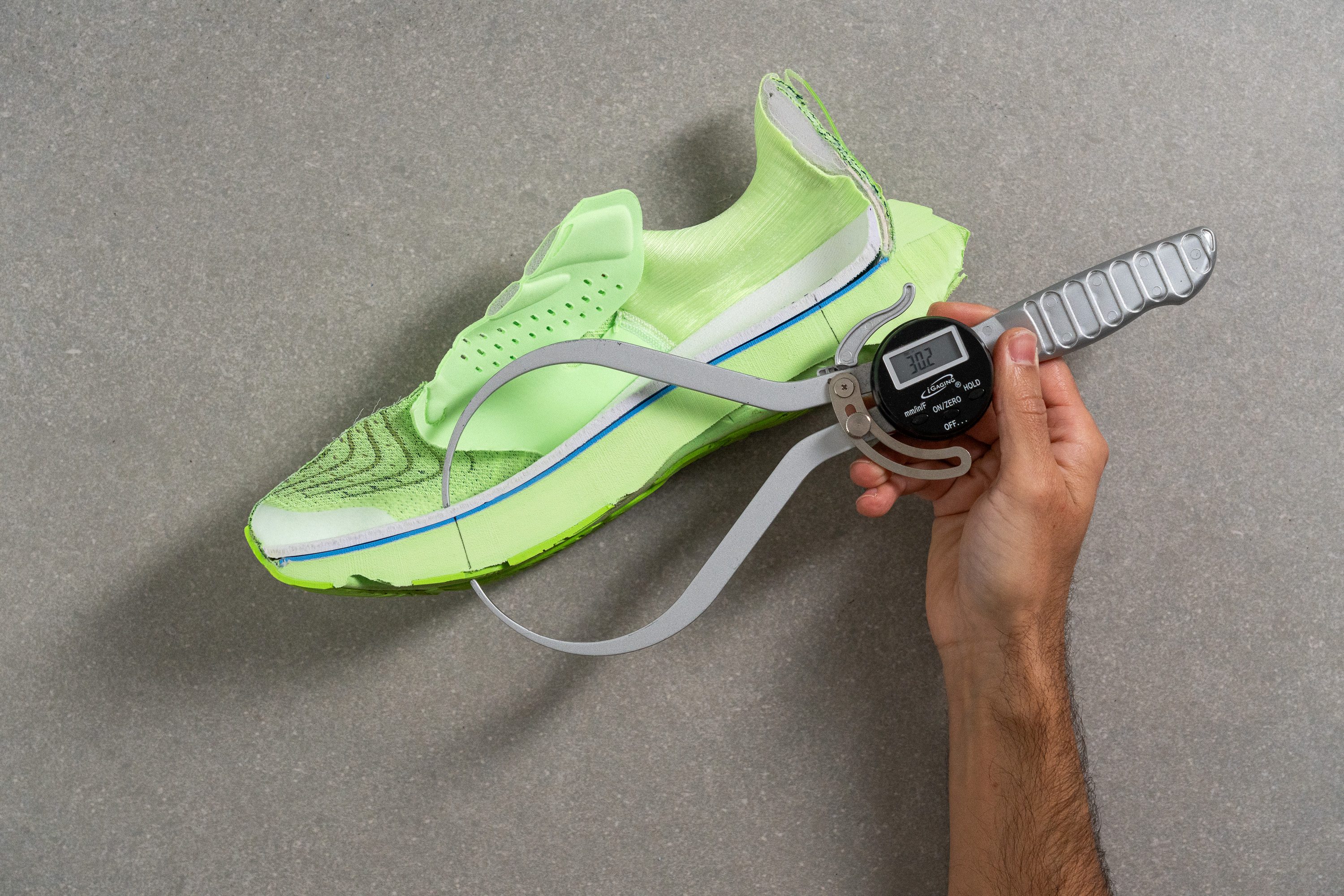
| Novablast 4 | 30.2 mm |
| Average | 26.2 mm |
Drop
We meticulously measured the heel and forefoot stack heights following World Athletics guidelines and discovered a 9.0-mm drop.
This differs slightly from ASICS' stated 8.0 mm, but it's so close that it's not a cause for concern. And with a forefoot stack height like this, a 9.0-mm offset works well for all types of footstrikes.
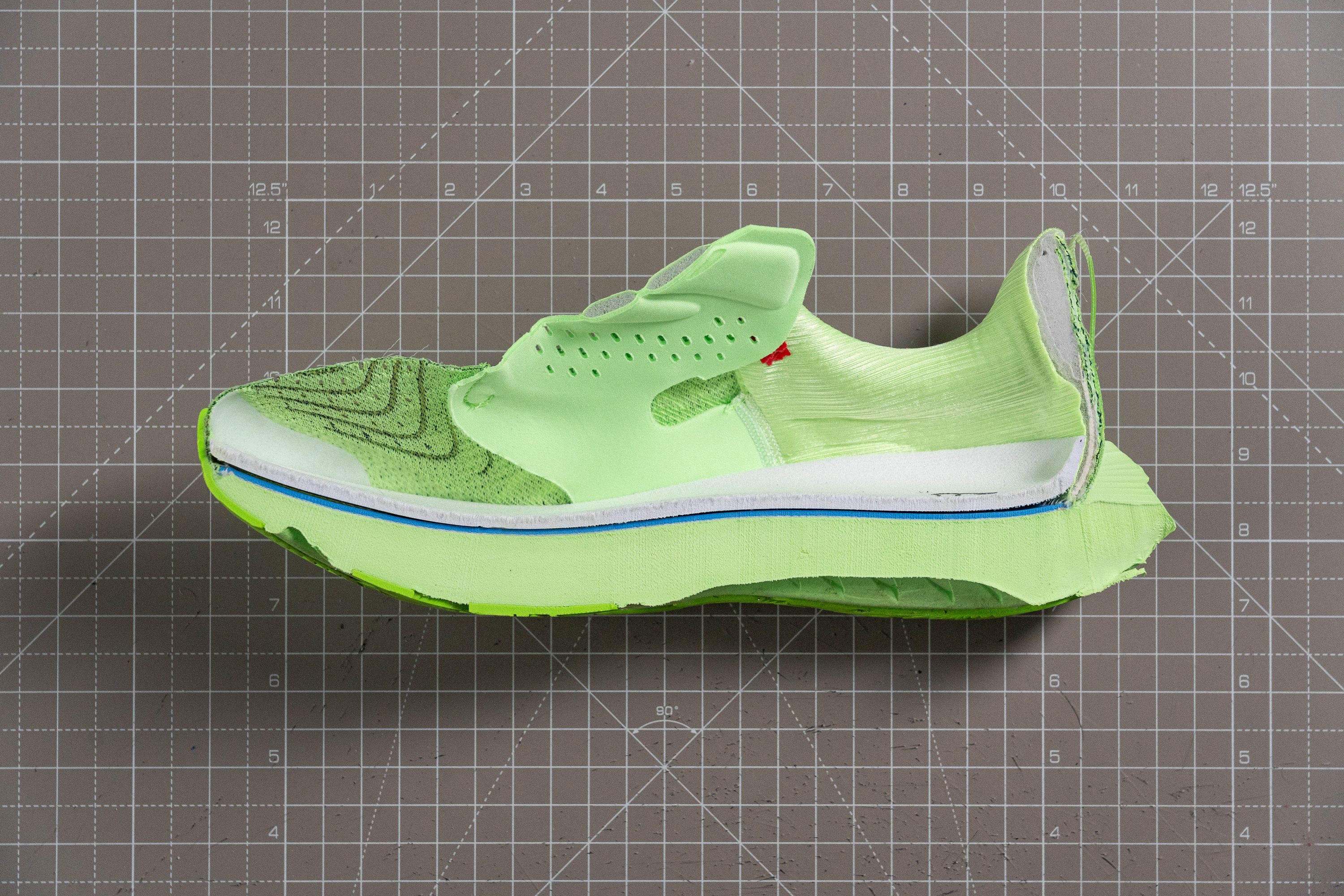
| Novablast 4 | 9.0 mm |
| Average | 8.6 mm |
Midsole softness
UpdatedLet's dive into the midsole, where there's plenty to talk about. ASICS has switched from FF Blast+ to FF Blast+ ECO, a foam we've already tested in the ASICS Nimbus 25.
This modification brings both benefits and drawbacks. The midsole registers at 36.3 AC in our Asker C durometer, which is around average. Plus, the EVA+OBC foam now consists of at least 20% bio-based materials from renewable sources, an effort many will appreciate.
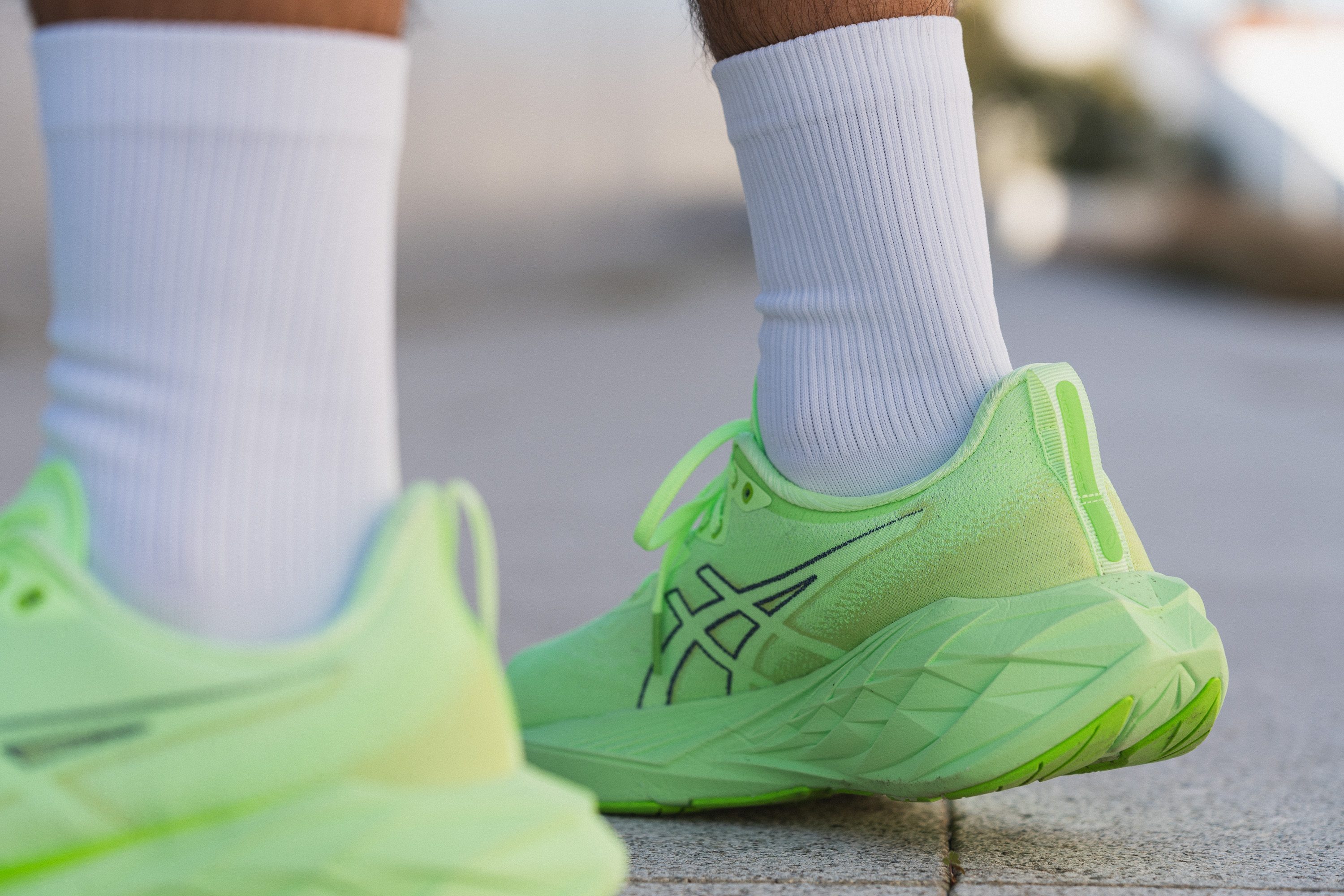
The main downside to this change is that, combined with the added weight that we revealed before, the Novablast 4 becomes less suited for speed workouts and more for steady, aerobic runs.
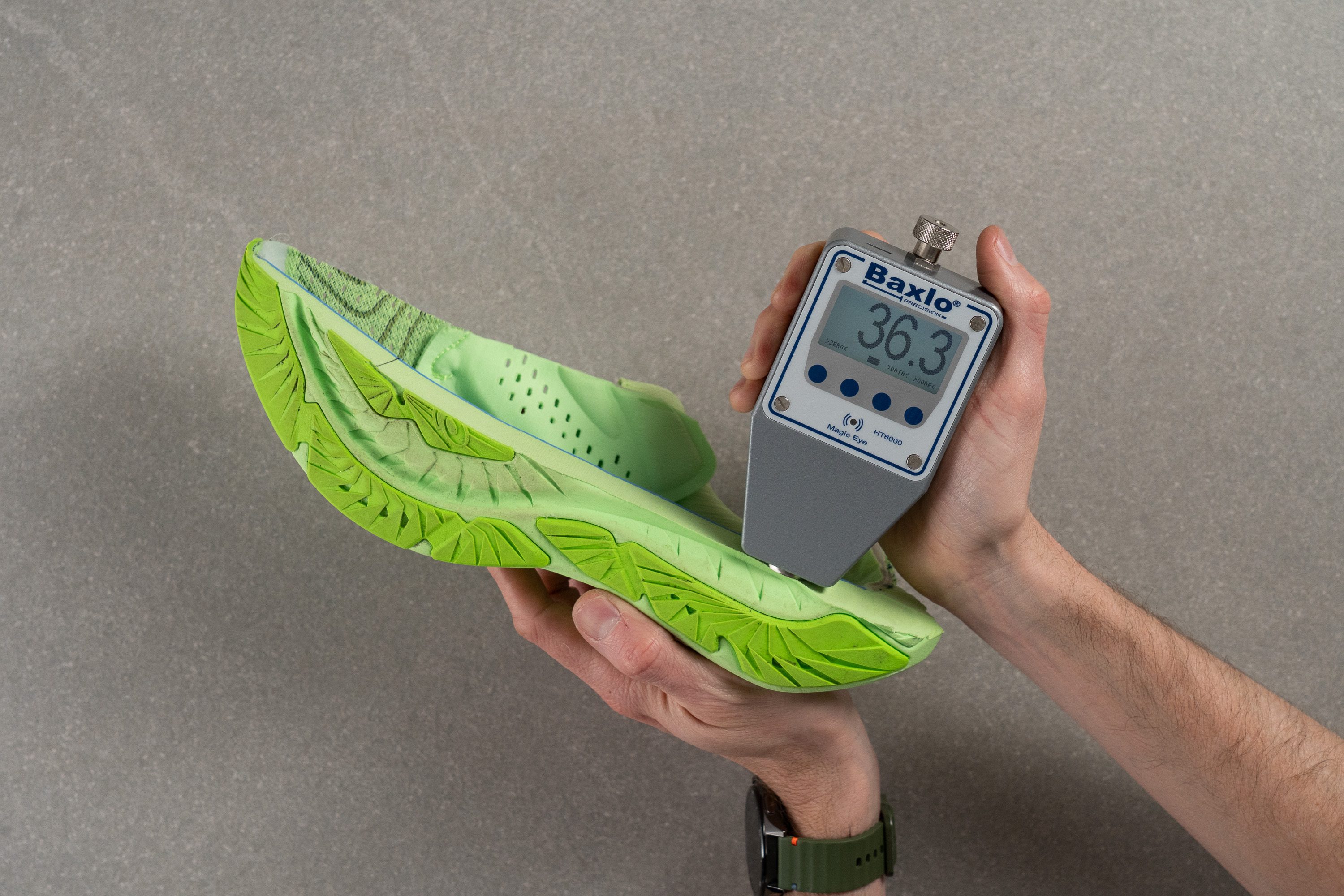
| Novablast 4 | 36.3 AC |
| Average | 36.3 AC |
Size and fit
Size
ASICS Novablast 4 fits true to size (240 votes).
Internal length
| Novablast 4 | 270.9 mm |
| Average | 269.4 mm |
Toebox width - widest part
One of the main complaints about previous Novablast models was the upper. It wasn't extremely narrow, but it definitely had a tight fit.
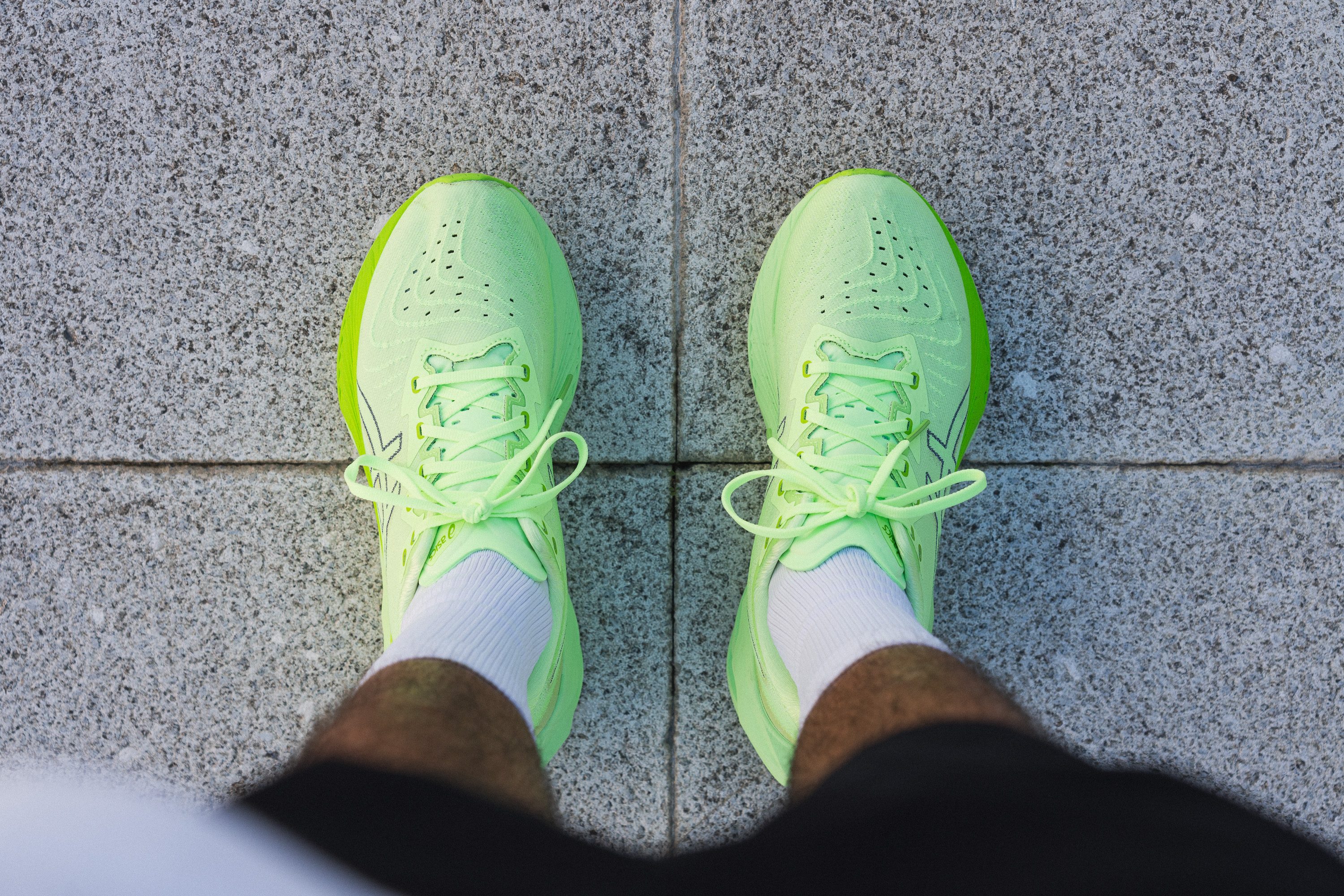
Now, it's just right, crafted for those with normal feet. It can also comfortably accommodate runners with narrow or wide feet, as long as they're not extreme cases.
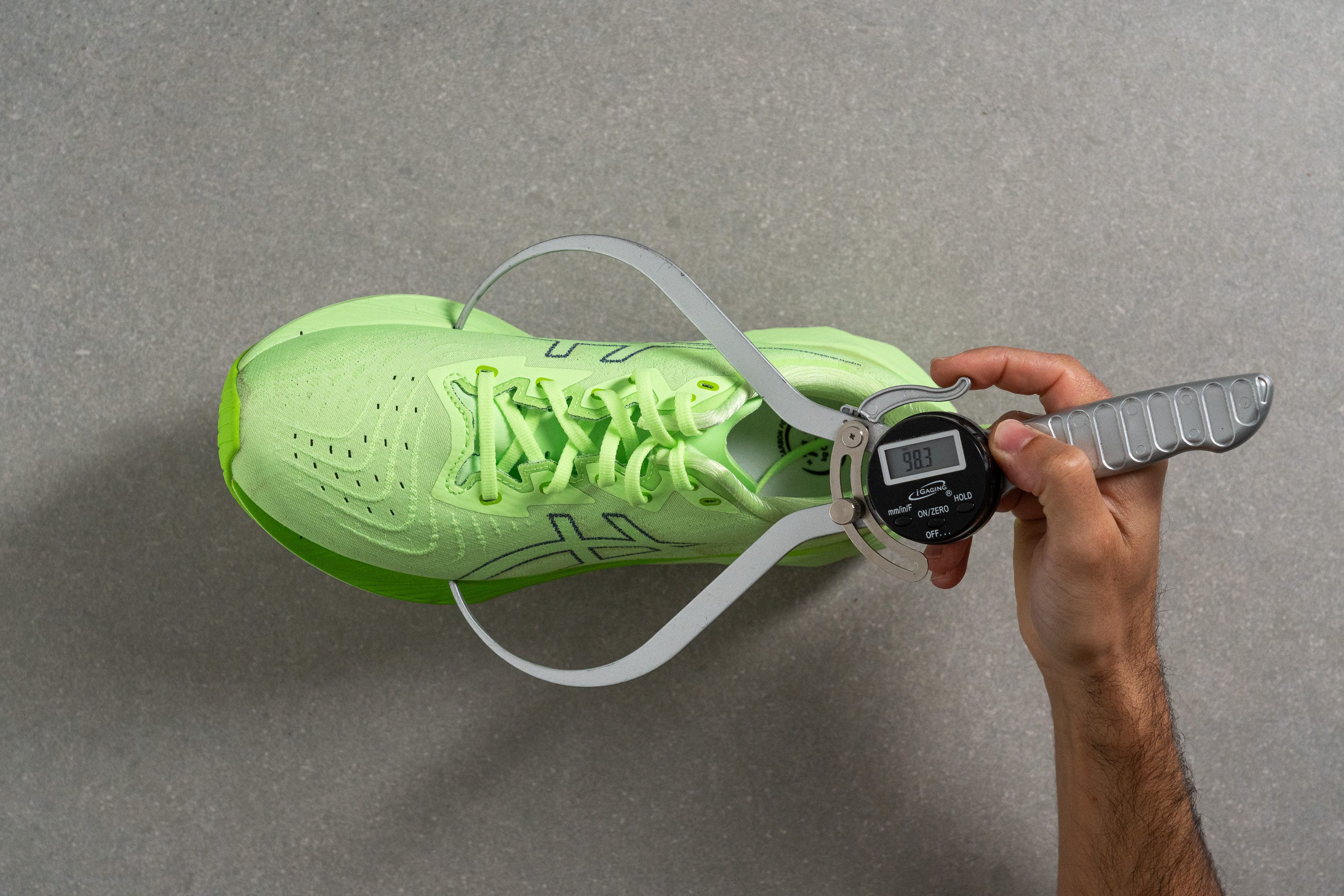
This test follows an older methodology, which is why you don't see recently tested shoes in the chart. Results from different methodologies can not be compared.
| Novablast 4 | 98.3 mm |
| Average | 98.5 mm |
Toebox width - big toe
The big toe area, measuring a neat 77.0 mm, is also quite average, something those of us with slightly wide feet—especially in the toe area—really appreciate.
We discovered the toebox has a comfortable average volume, offering plenty of space for our toes to move freely and comfortably, which is evident in the video above.
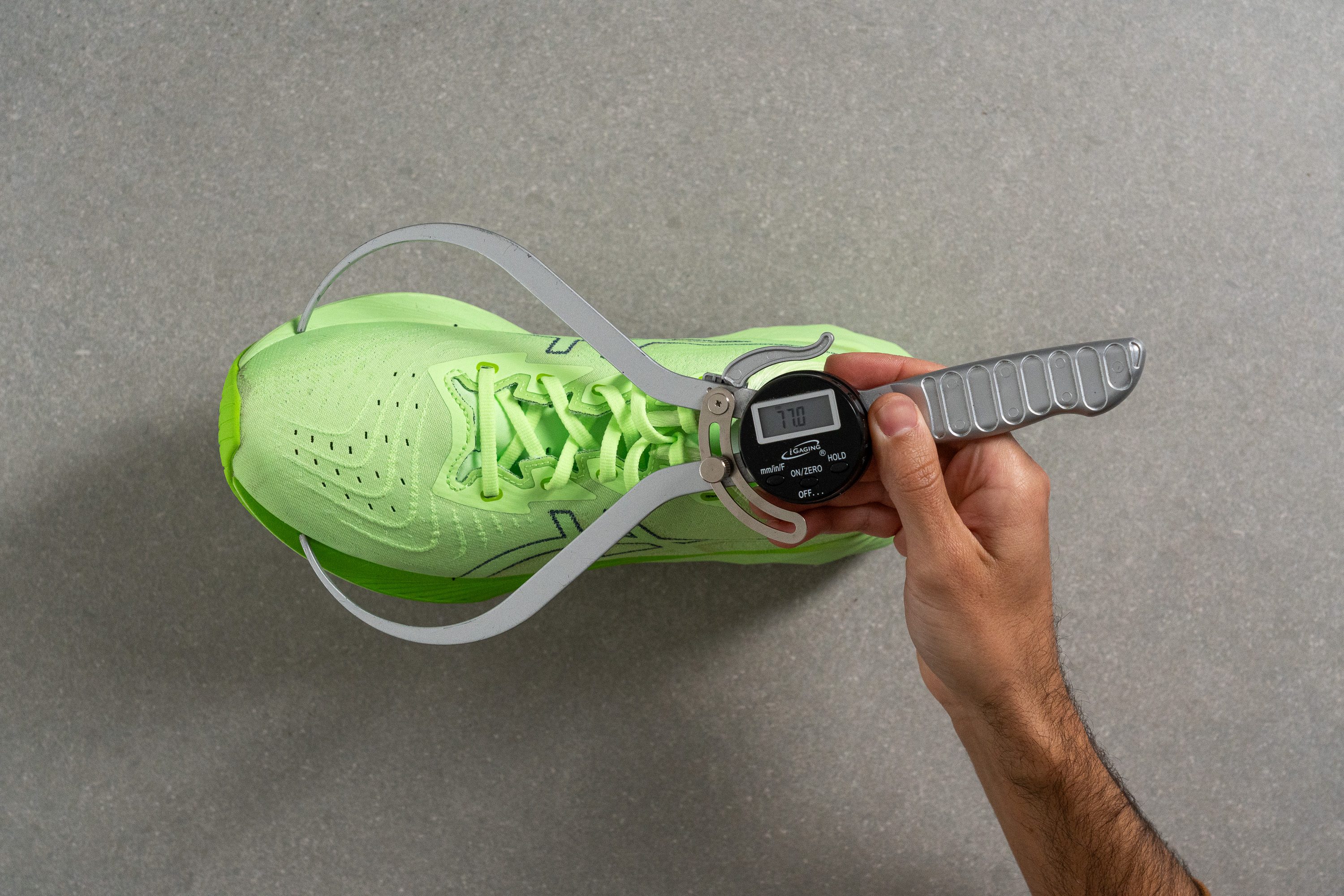
This test follows an older methodology, which is why you don't see recently tested shoes in the chart. Results from different methodologies can not be compared.
| Novablast 4 | 77.0 mm |
| Average | 78.4 mm |
Traction / Grip
Traction test
The Novablast 4 features plenty of exposed foam and skips the ASICSGRIP rubber, so we didn’t expect jaw-dropping traction. Once we soaked the concrete and ran our test, the result landed in the safe zone.
It posted a decent 0.47 grip score that holds well on dry roads and remains acceptable in light rain. For most everyday runs, though, this trainer still offers enough underfoot confidence to get the job done—just don’t expect rain-ready traction like in ASICS’ premium options like the Nimbus 27.
| Novablast 4 | 0.47 |
| Average | 0.49 |
Outsole design
The outsole was an important update in version 4, since it was the Novablast 3’s biggest weak point. We found that ASICS improved the grip to a good level, and the rubber is now spread out better to avoid quick wear.
It still stays light—one of the Novablast’s main features—with a clever mix of grippy areas and weight-saving cutouts in the center that help keep the shoe light.
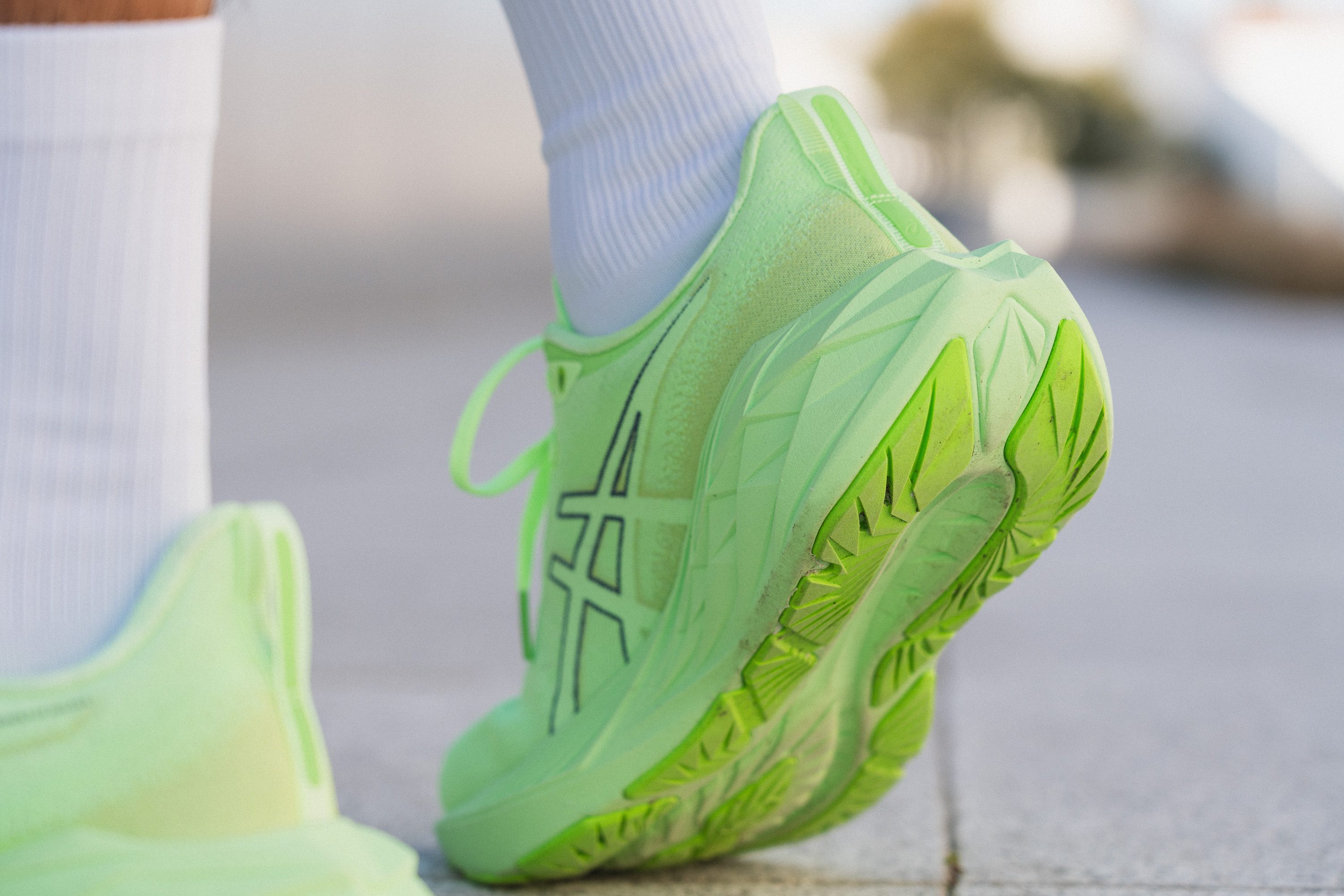
Flexibility / Stiffness
The Novablast 4 is a non-plated shoe, which is ideal for a daily trainer. This is why it scored an average result in our 30-degree bend test at 17.8N.
Being flexible from a longitudinal standpoint is crucial for comfort—not just for daily running but also for walking or going to the gym. Sure, this shoe doesn’t bend like a low-stacked model, but still, it’s a good outcome for such a towering midsole.
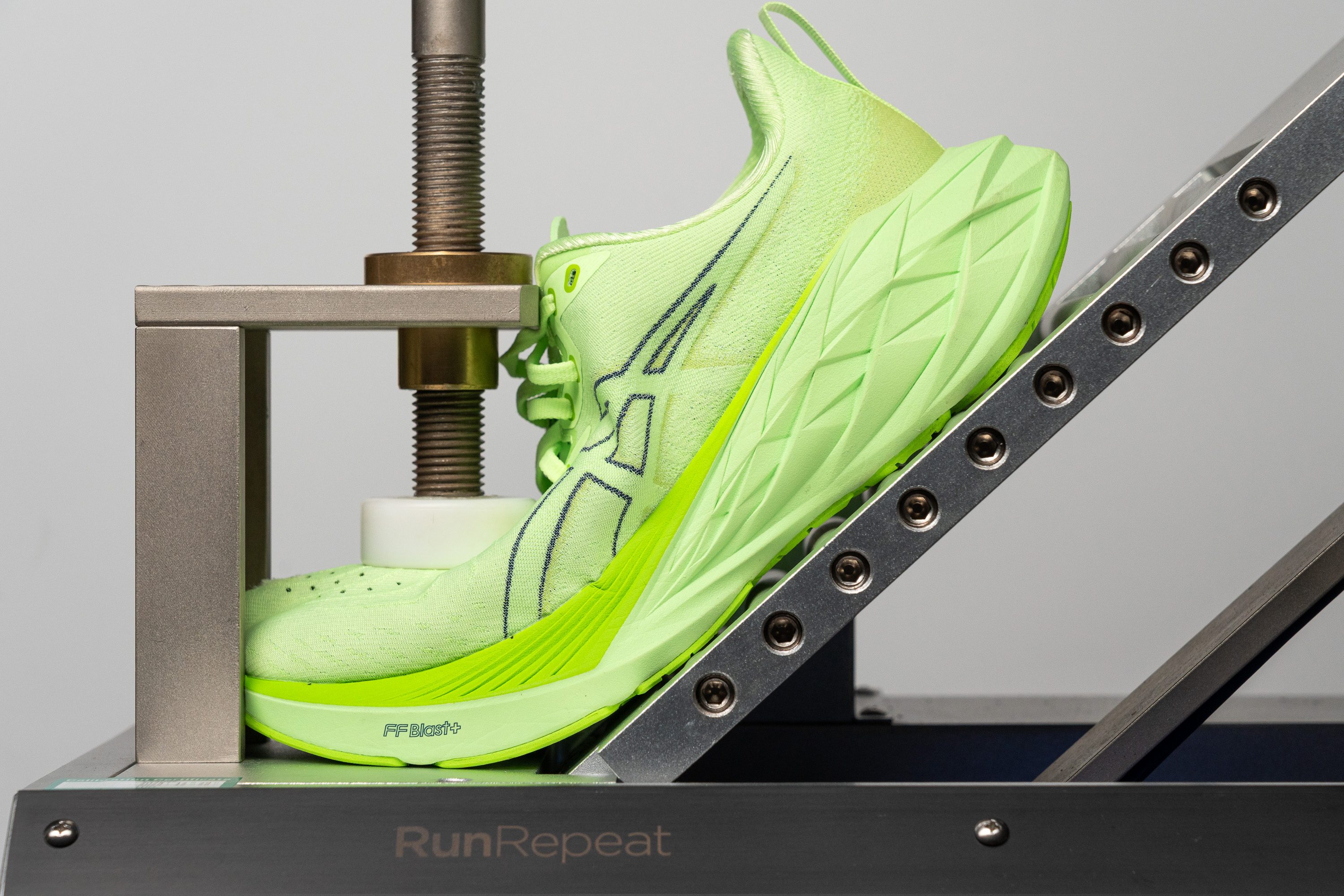
| Novablast 4 | 17.8N |
| Average | 15.4N |
Weight
As we suspected from our earlier lab tests—thicker rubber, comfier upper—the Novablast has gained some weight. Now at 9.1 oz (259g), it's still in the lightweight category for a daily trainer, yet it's 7% heavier than the v3.
Is this a good trade-off? In our view, adding 17g to this particular shoe is a wise move if it means more foam, greater comfort, and enhanced durability. It's a minor increase in weight and a luxury ASICS can afford, given that the v3 was already quite light.
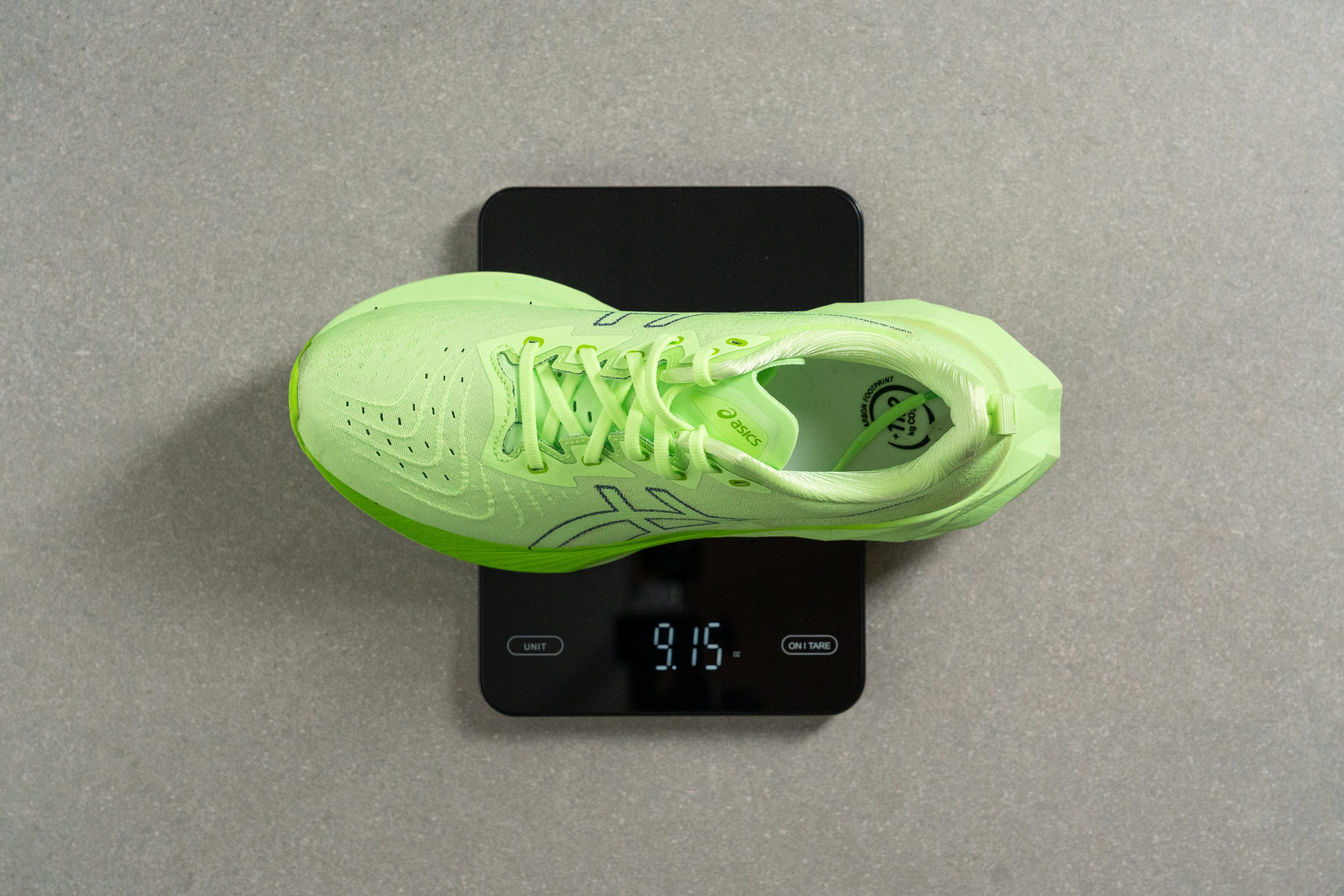
| Novablast 4 | 9.1 oz (259g) |
| Average | 9.3 oz (264g) |
Breathability
ASICS had a golden opportunity to improve breathability in the Novablast, but our lab tests reveal that we're pretty much at the same spot as before, awarding the Novablast 4 the same 3/5 score as last year's model.
Our analysis of the upper shows ASICS revamped it from v3, opting now for a cozier, thicker engineered mesh. However, this new mesh somewhat reduced airflow. To balance this, they peppered the toebox with numerous holes, enhancing air and moisture escape.
We turned on the microscope to take a closer look—confirming our initial thoughts: the Novablast 4 sports a really thick mesh paired with full-size ventilation holes.
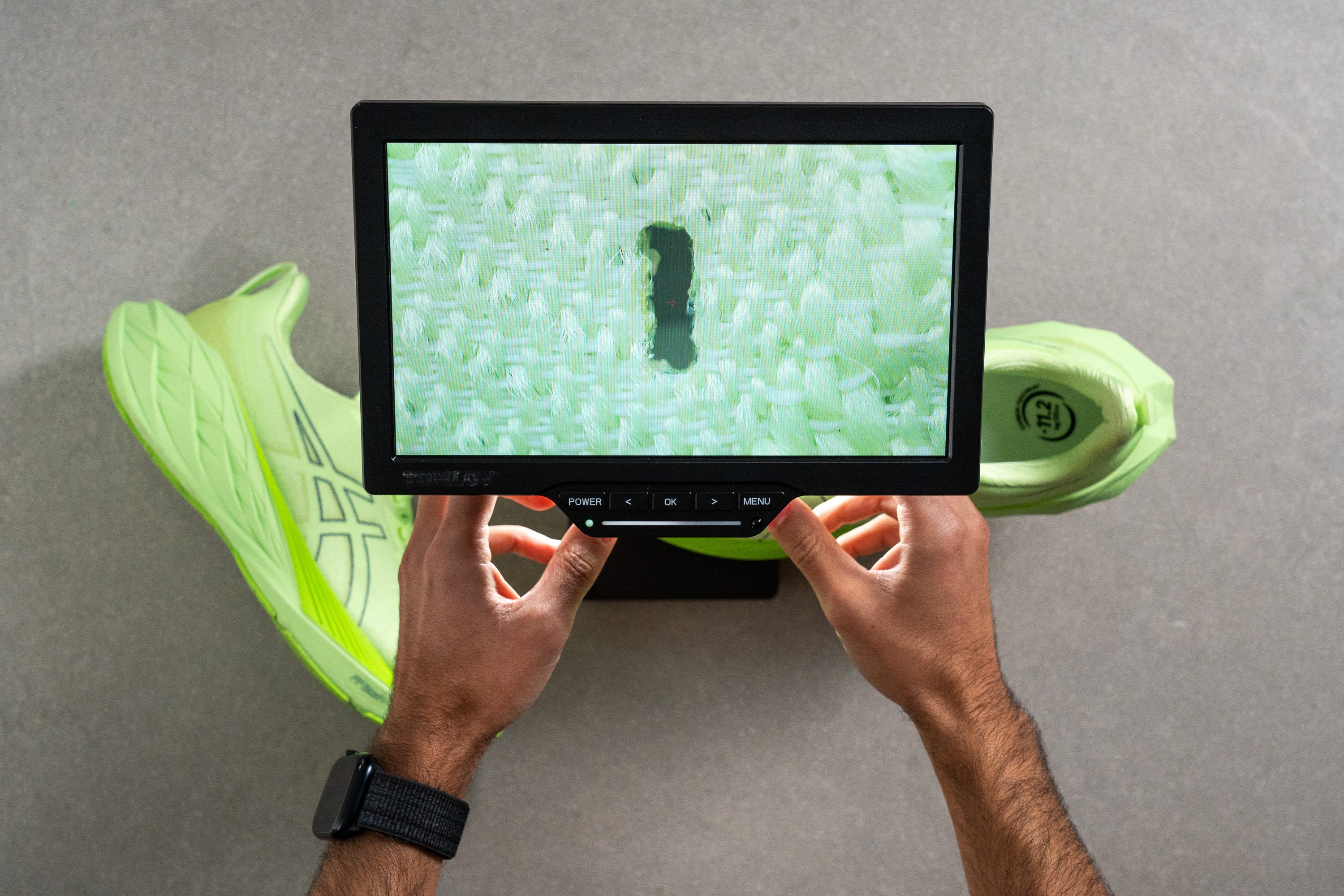
Is this the optimal design for an upper? It's a mixed bag. For those seeking a blend of durability, comfort, and breathability, it might hit the mark. We're eager to see how it performs in our upcoming tests with the Dremel, though.
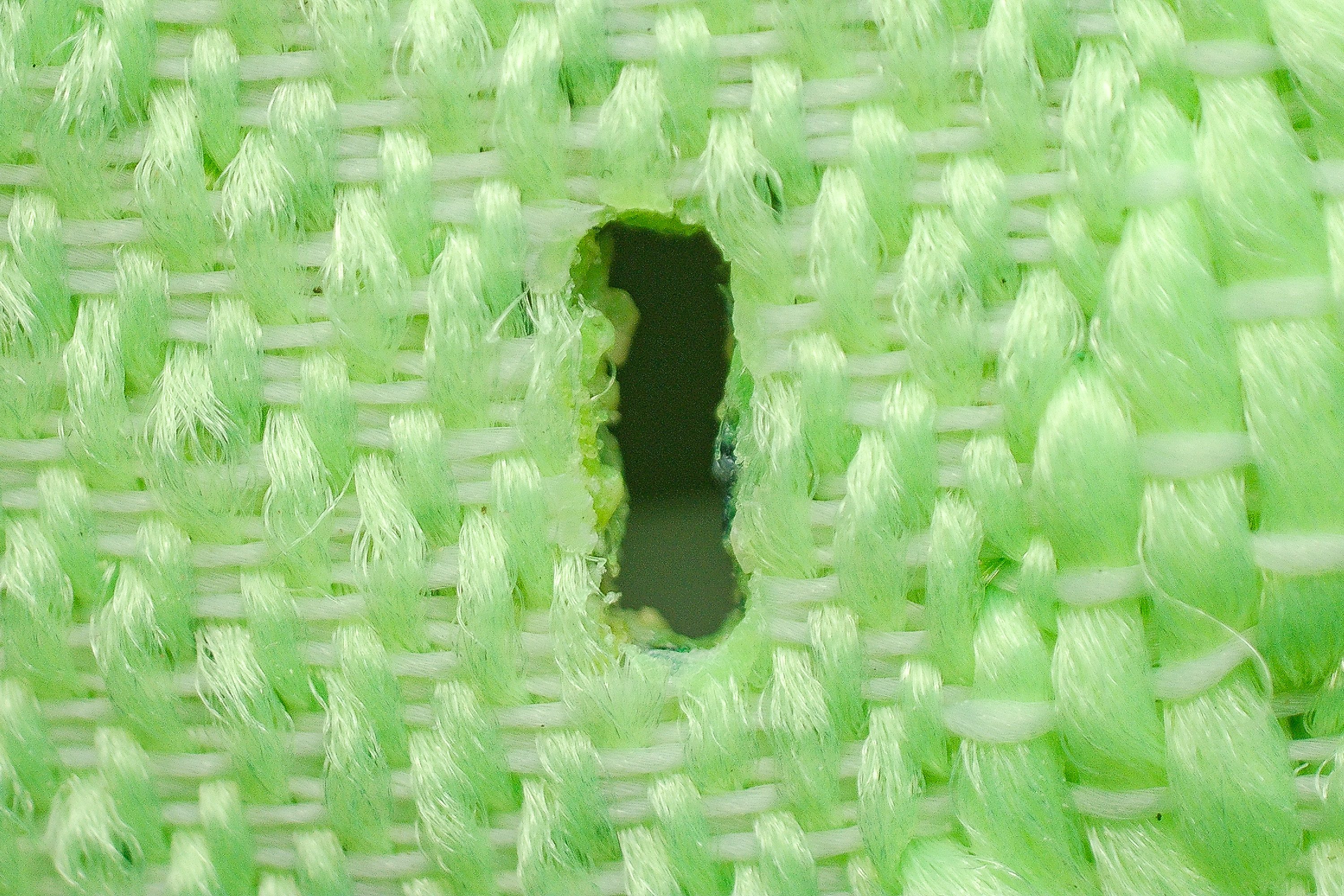
What really stands out to us is the thoughtful design. Unlike many other shoes that stick to the same material throughout, this one features a soft and cozy interior, while the exterior is tougher and more durable.
ASICS is clearly raising the bar with this upper, but we'd also love to see this shoe reach at least 4/5 in breathability, especially for runners tackling extremely hot conditions.
| Novablast 4 | 3 |
| Average | 3.7 |
Stability
Lateral stability test
A delightful surprise in this update is the enhanced stability. ASICS has made improvements throughout the shoe to achieve this, as we'll reveal in our upcoming tests, and we're really impressed with it.
While it's not quite suitable for those with severe pronation or supination issues, it's a safe choice for neutral runners and those with minor stability needs. In fact, it's the most stable Novablast yet by a significant margin.
Torsional rigidity
Another simple method to enhance stability in a daily trainer is by making it lean towards the more rigid side, and that's exactly what ASICS did.
It's not as stiff as steel, but we found it certainly feels more rigid than other daily trainers on the market, and we rated it at 4/5. However, with this high stack height, there wasn't much choice in the matter.
| Novablast 4 | 4 |
| Average | 3.5 |
Heel counter stiffness
The heel counter's stiffness is balanced, rated at 3/5—it's not too intrusive yet not overly soft. Essentially, ASICS aimed to satisfy the majority with this design, and they've certainly succeeded.
It's also crucial to emphasize that the fabric in the heel area is not just durable, as we previously proved with the Dremel, but it also secures the feet exceptionally well to prevent heel slippage.
| Novablast 4 | 3 |
| Average | 2.9 |
Midsole width - forefoot
But the biggest change ASICS made for better stability is the increased midsole width in the forefoot.
At 122.8 mm, the NB4 is really wide, offering a landing base akin to stability shoes. While it might be even a bit much for those with perfect neutral running technique, runners with slight pronation or supination issues will absolutely appreciate this change.
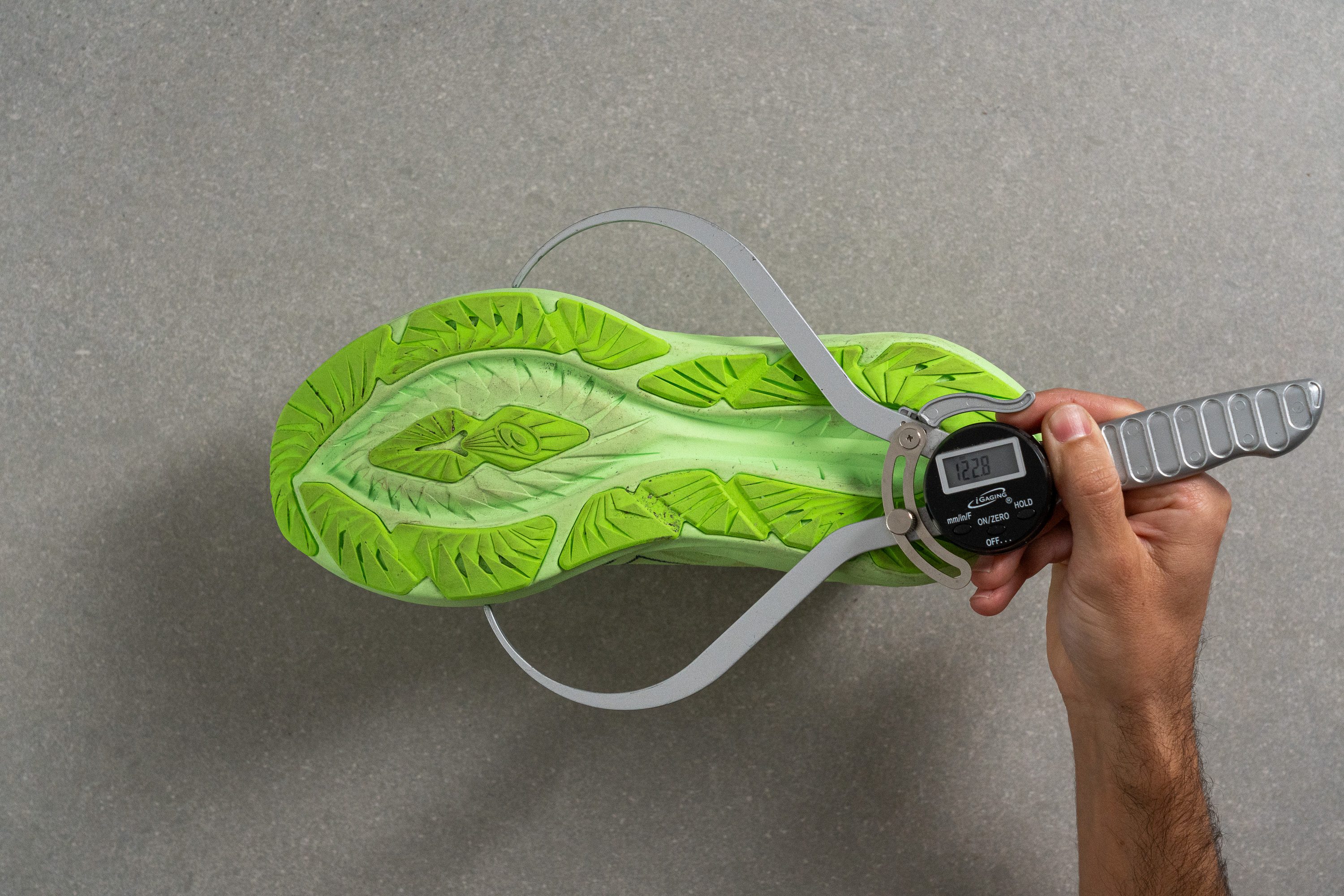
| Novablast 4 | 122.8 mm |
| Average | 114.4 mm |
Midsole width - heel
The heel is almost identical to the previous version, with just a slight increase bringing it to 94.7 mm. It's still wider than average, making it ideal for heel strikers, who make up the majority of runners.
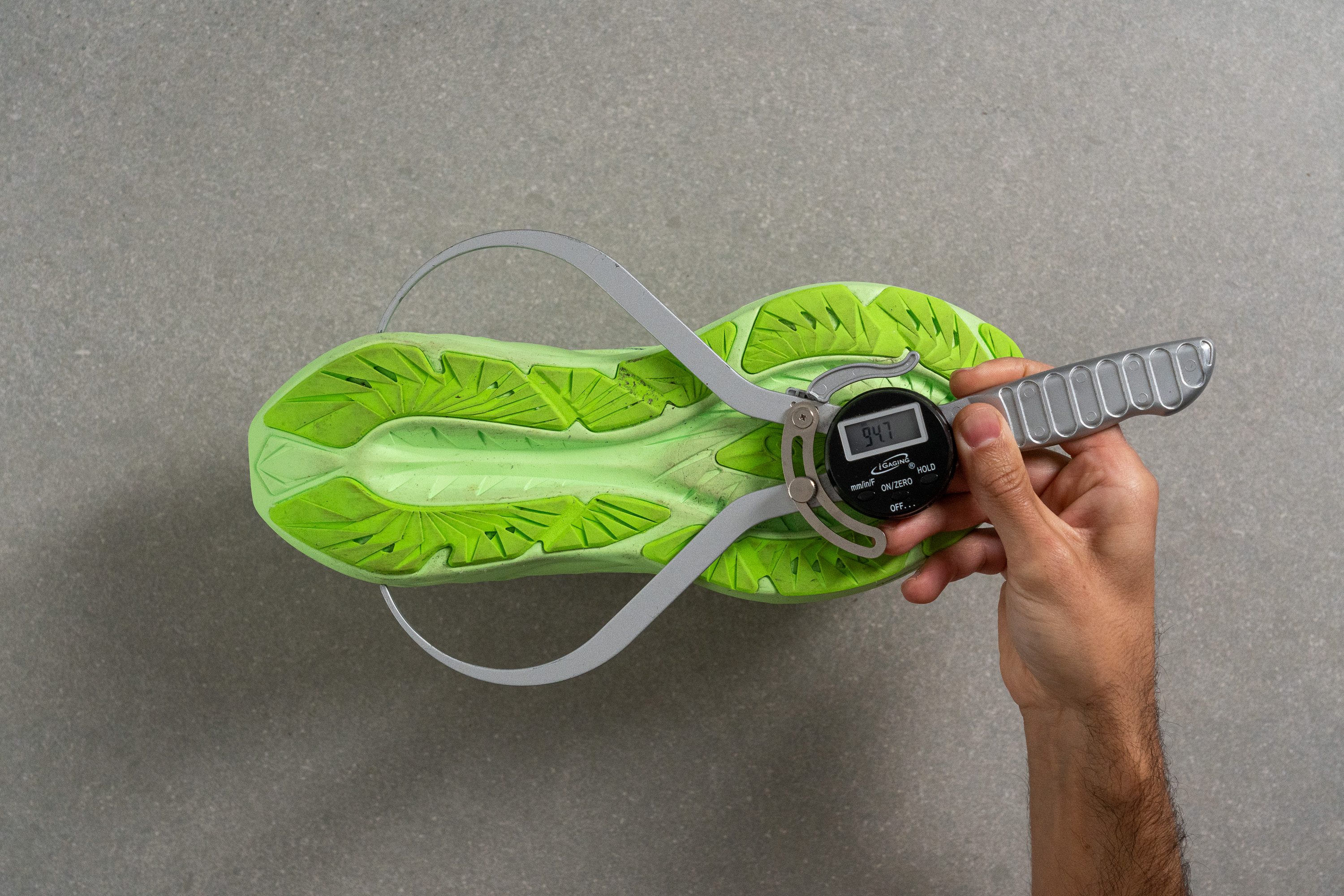
| Novablast 4 | 94.7 mm |
| Average | 90.6 mm |
Durability
Toebox durability
We had hopes that the Novablast's average breathability might hint at a durable upper. To test this theory, we challenged the mesh with a Dremel at 5K RPM and 3.2N of force.
It turns out, the upper resisted impressively. We rate its durability a strong 3/5, outshining most daily trainers in the market.
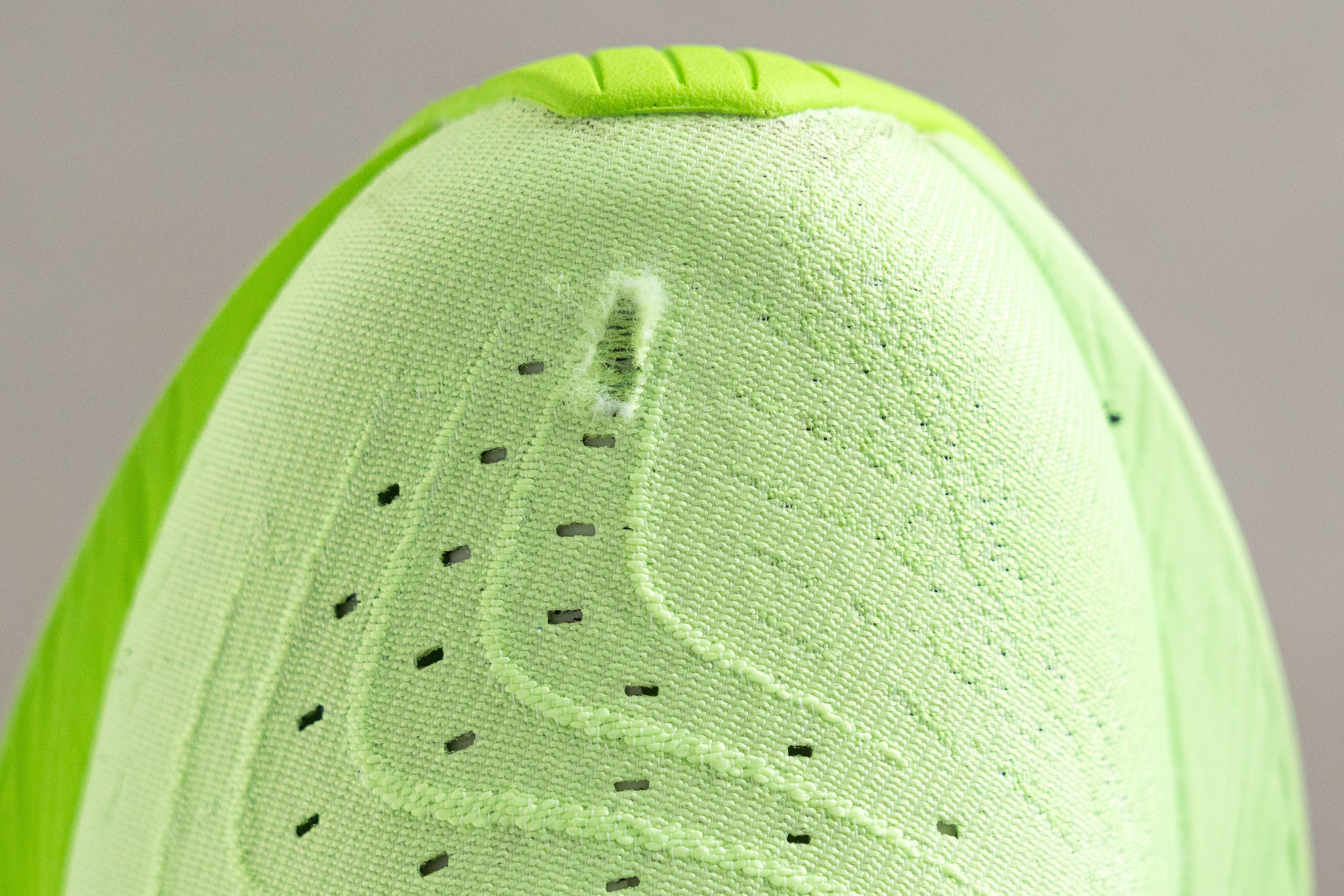
| Novablast 4 | 3 |
| Average | 2.6 |
Heel padding durability
We then turned our attention to the heel counter, a critical area for many runners as it often wears out quickly. We put it through its paces with the Dremel, applying the same 5K RPM and 3.2N of force, and the shoe scored a perfect 5 out of 5!
This achievement is particularly impressive considering the ample padding in the heel area and the comfortable fabric ASICS uses. Usually, such a combination tends to wear out faster, but they've somehow managed to make it both durable and comfortable for every run.
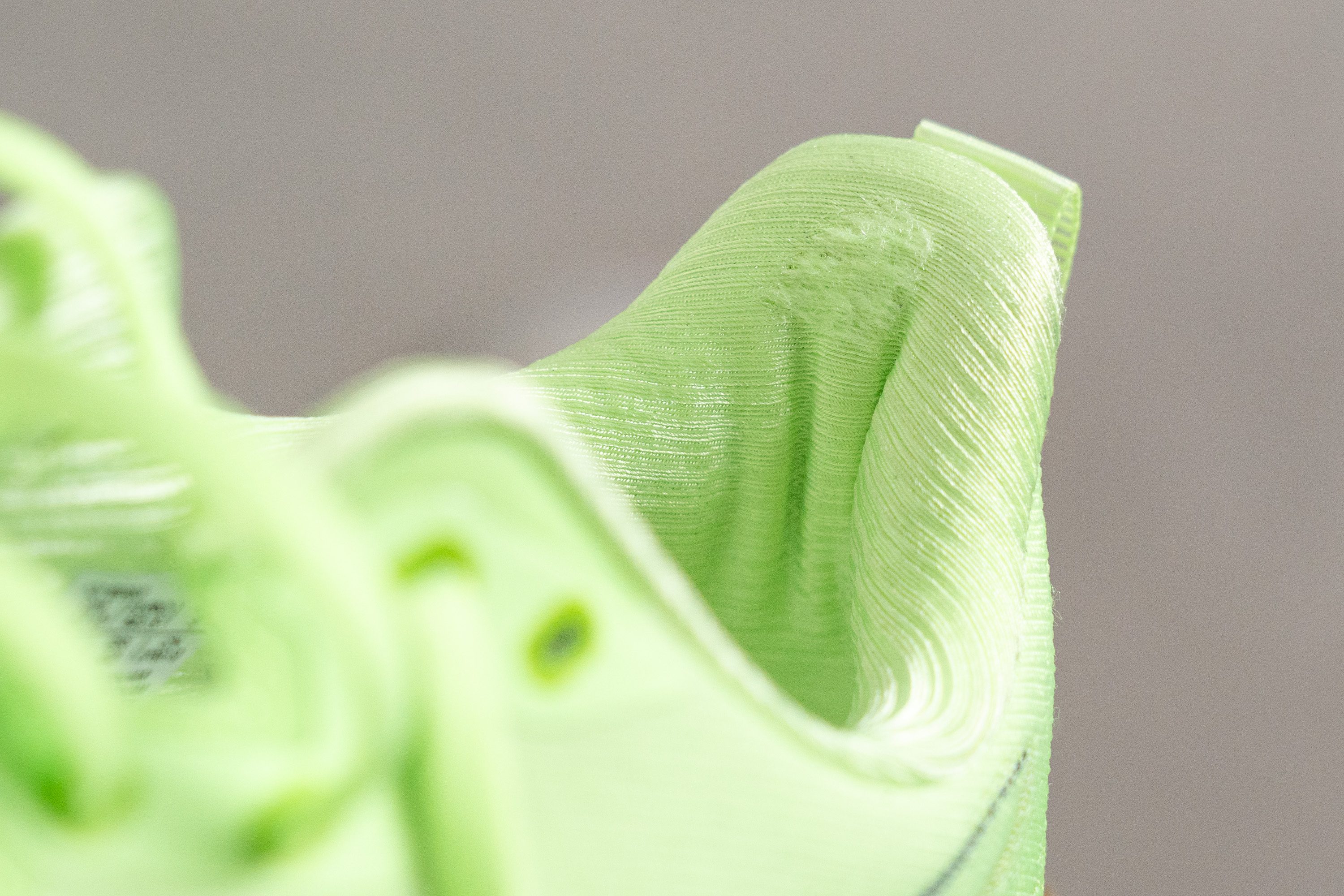
| Novablast 4 | 5 |
| Average | 3.4 |
Outsole durability
Despite the new AHAR formulation being slightly softer, the Novablast 4 delivered an outstanding performance in our outsole durability test.
After cranking the Dremel up to 10K RPM, we only observed a minor 0.6-mm indentation. This impressive result boosts our confidence in the shoe's longevity.
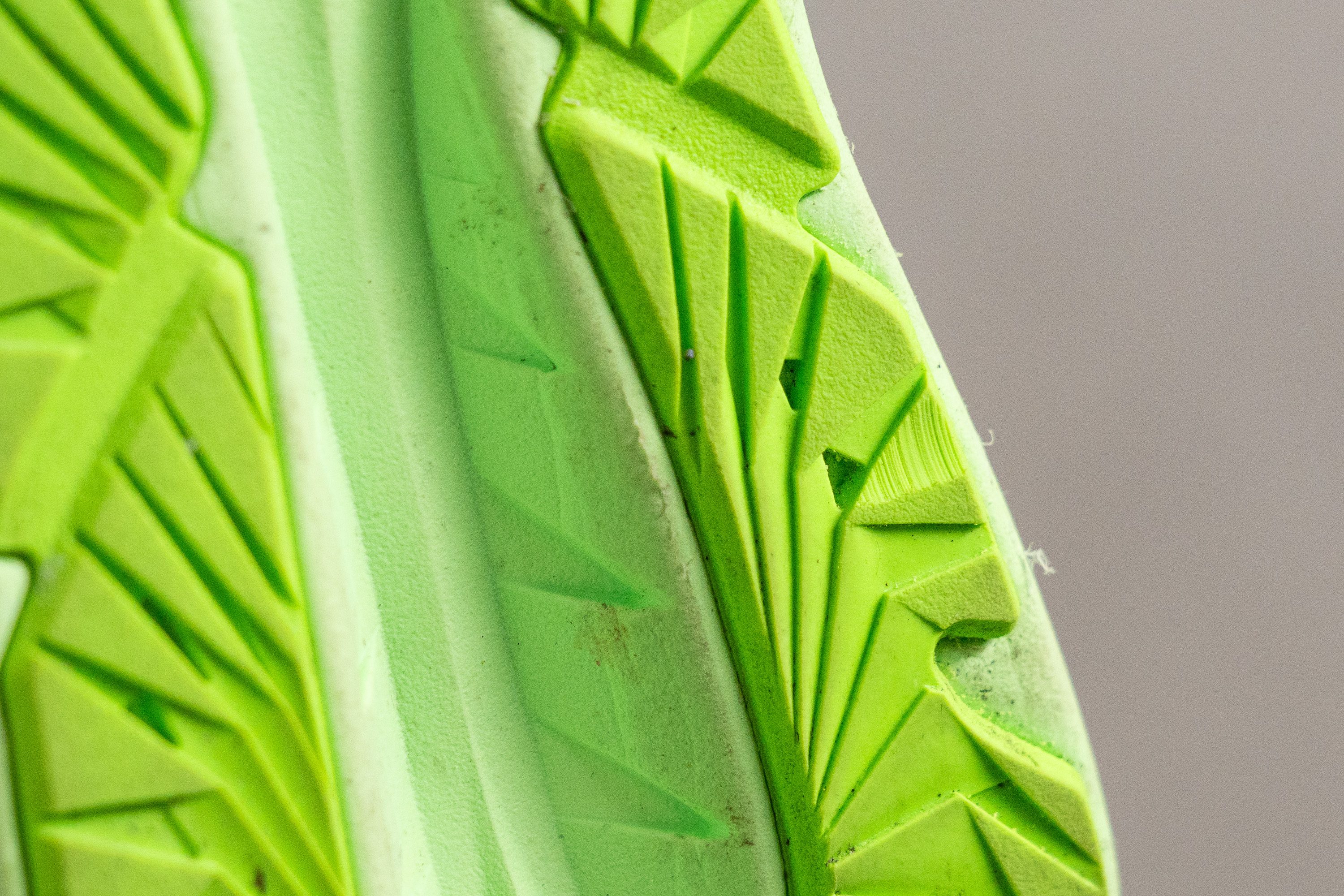
| Novablast 4 | 0.6 mm |
| Average | 1.1 mm |
Outsole thickness
To ensure durability, ASICS put 3.9 mm of rubber to the Novablast 4's outsole. This thickness is more than sufficient to ensure the midsole wears out before the outsole does.
This is an increase from the previous version's 3.1 mm, once again indicating that ASICS aimed to enhance durability, even if it meant adding a bit of weight.
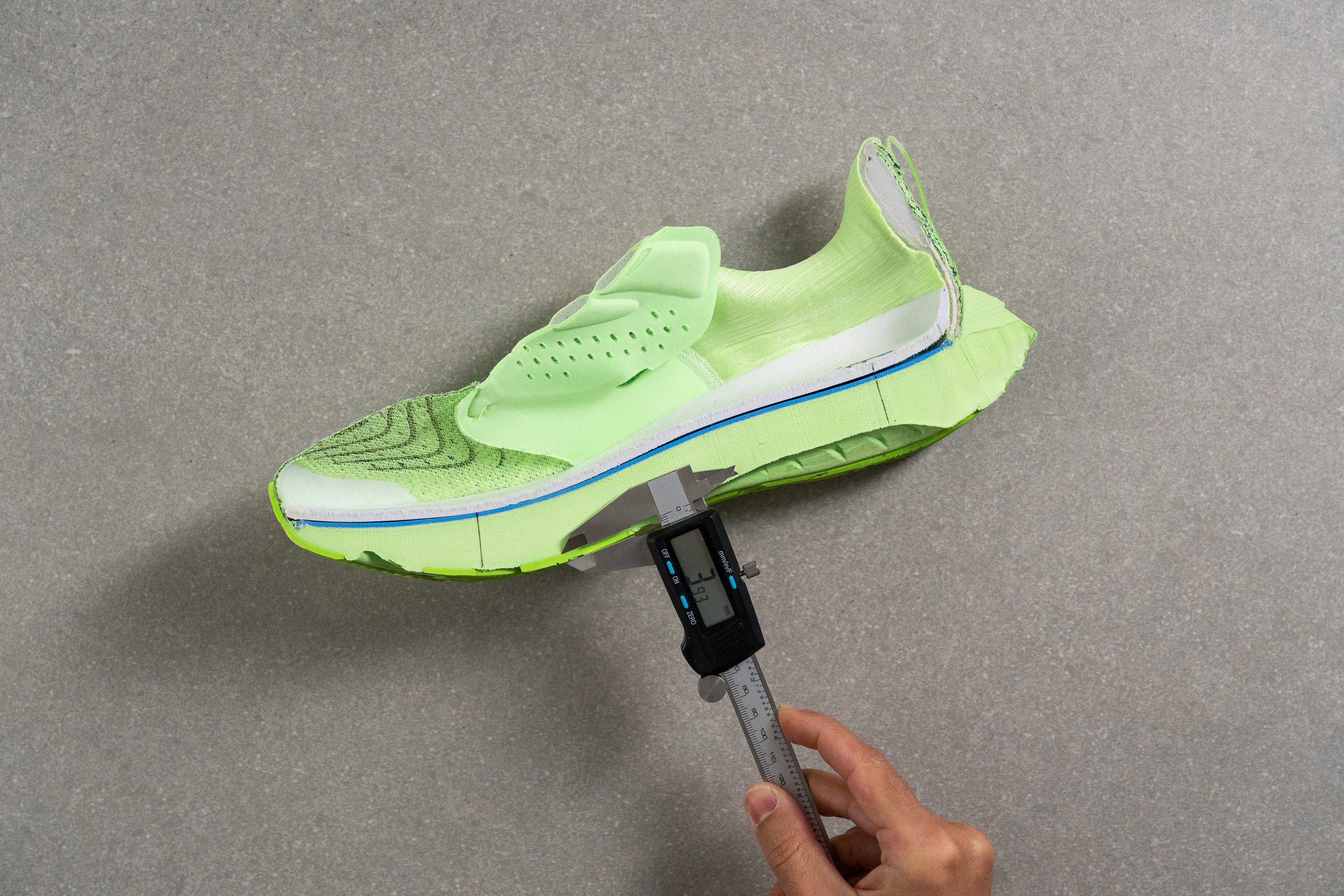
| Novablast 4 | 3.9 mm |
| Average | 3.2 mm |
Misc
Insole thickness
ASICS played it safe with the insole—it's exactly the same as last year's model, featuring an average, 4.4-mm thickness. It worked well before, so why change it?
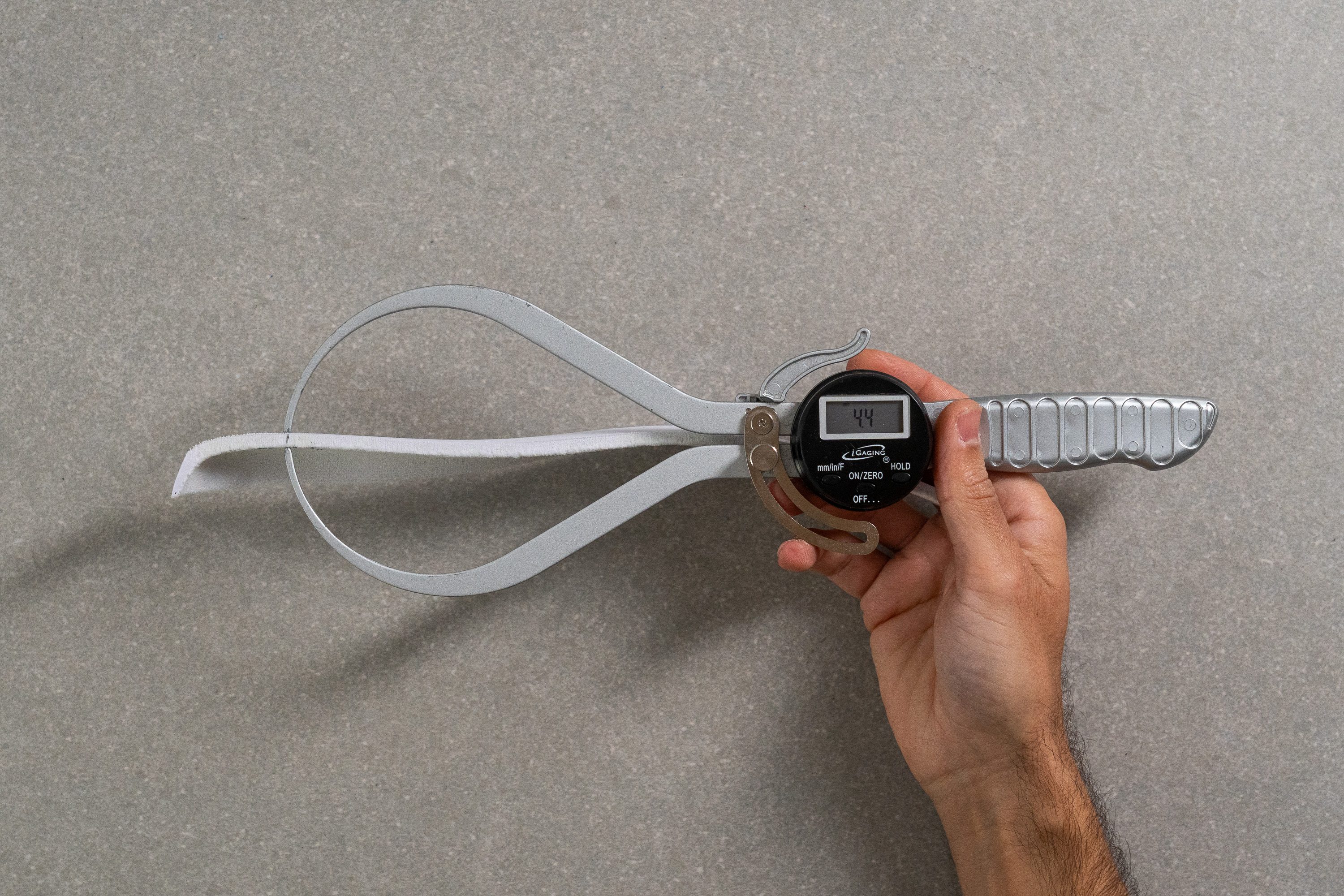
| Novablast 4 | 4.4 mm |
| Average | 4.5 mm |
Removable insole
The insole is easy to take out as it's not glued, and thanks to the midsole and upper's standard size, fitting insoles from other shoes or custom orthotics won't be an issue at all.
However, they might feel different compared to the included insole, which is slightly flared to enhance both stability and comfort.
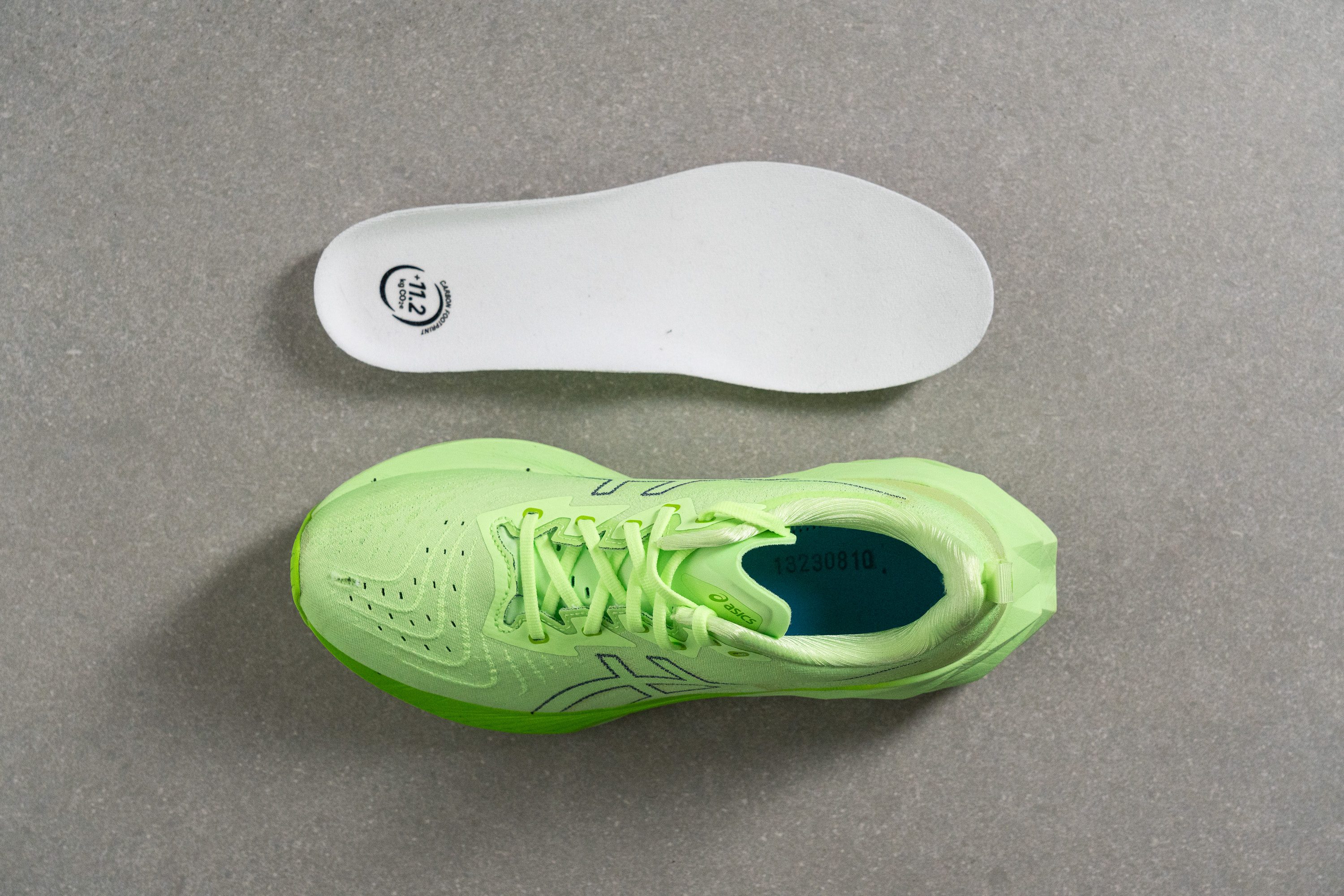
| Novablast 4 | Yes |
Midsole softness in cold
To test the Novablast 4's performance in extremely cold conditions, we placed it in a freezer for 20 minutes and then retested it. After freezing, it registered a balanced 22.3 HA.
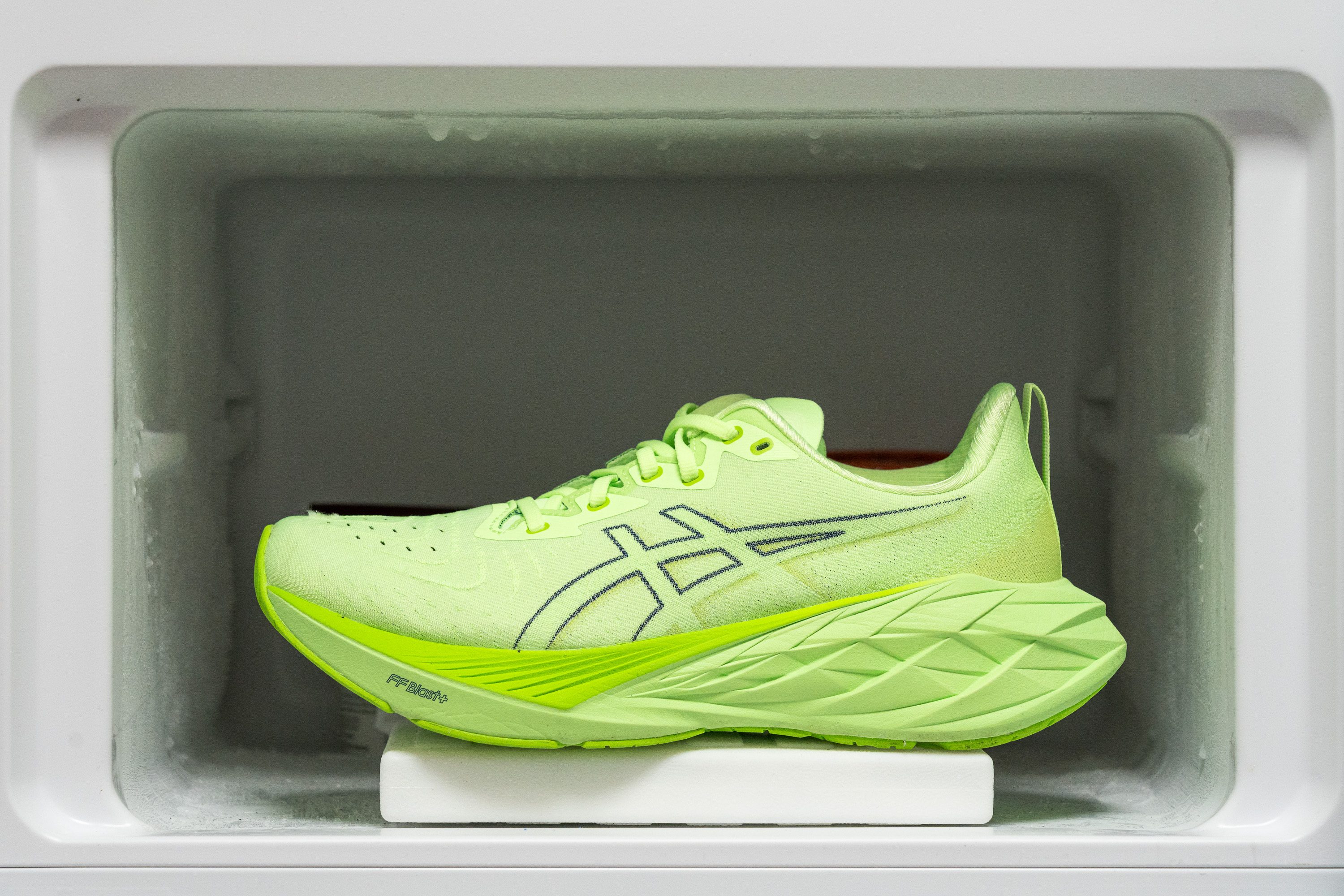
| Novablast 4 | 22.3 HA |
| Average | 25.0 HA |
Midsole softness in cold (%)
This resulted in a 31.8% increase, which was clearly noticeable, yet not at all troubling.
However, it's important to keep in mind that FF Blast+ ECO is still mostly based on EVA. This means its performance in cold temperatures isn't the best possible, as we detailed in our comprehensive guide on this topic.
For a bouncy midsole that excels in cold conditions, you should consider the Nike Invincible 3, which boasts Pebax-based ZoomX.
| Novablast 4 | 32% |
| Average | 24% |
Reflective elements
We're big believers that every daily training shoe should have some reflective elements, and ASICS really nailed it this time.
| Novablast 4 | Yes |
Tongue padding
We measured the Novablast 3's padding at a razor-thin 1.3 mm, which, while great for us in the lab, raised concerns for many runners who prefer tightly tied laces.
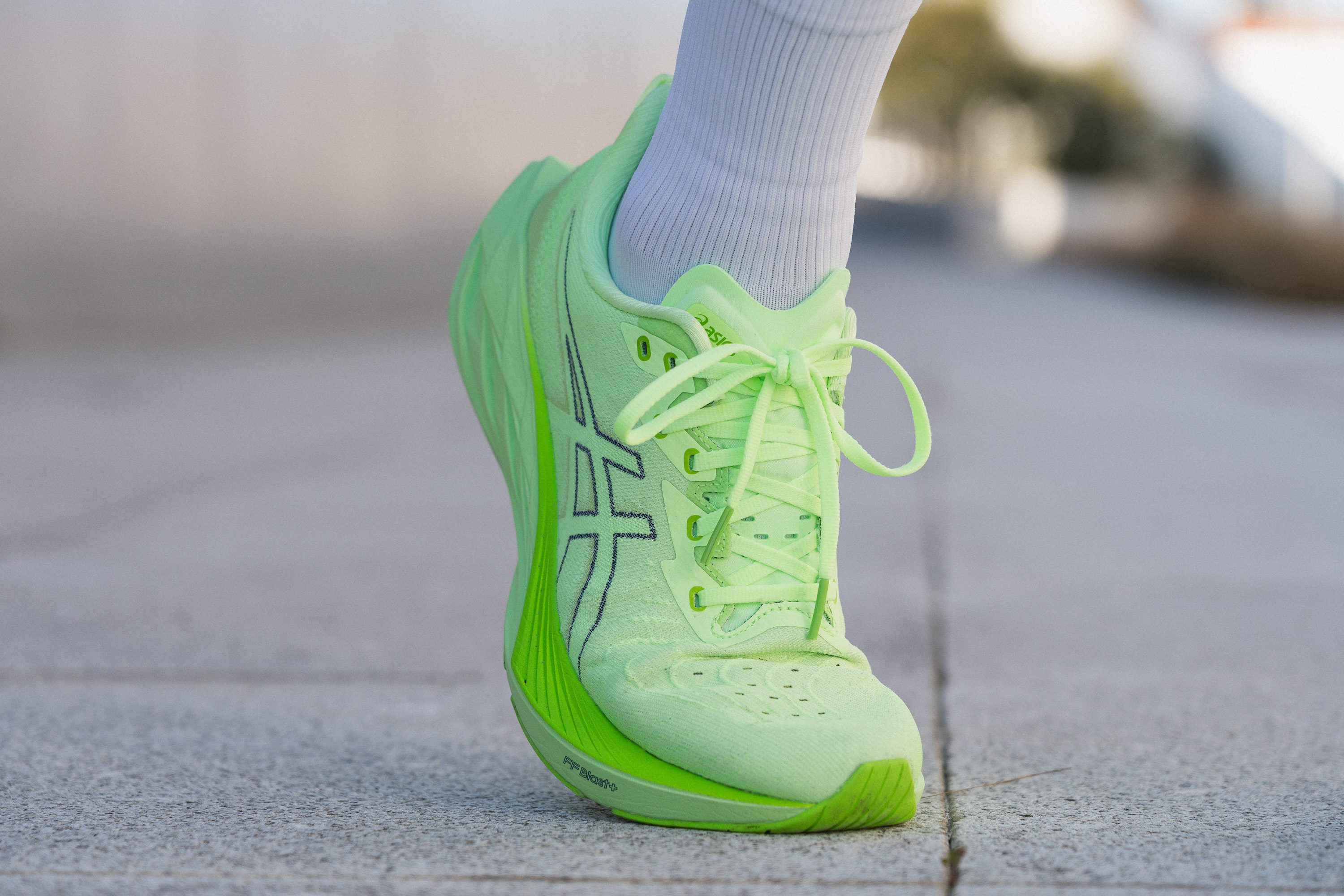
With the Novablast 4, you're treated to a properly padded tongue at 5.8 mm, similar to most daily trainers on the market. Yet, this padding isn't continuous; it's sectioned off in a smart design to avoid adding too much weight to the shoe.
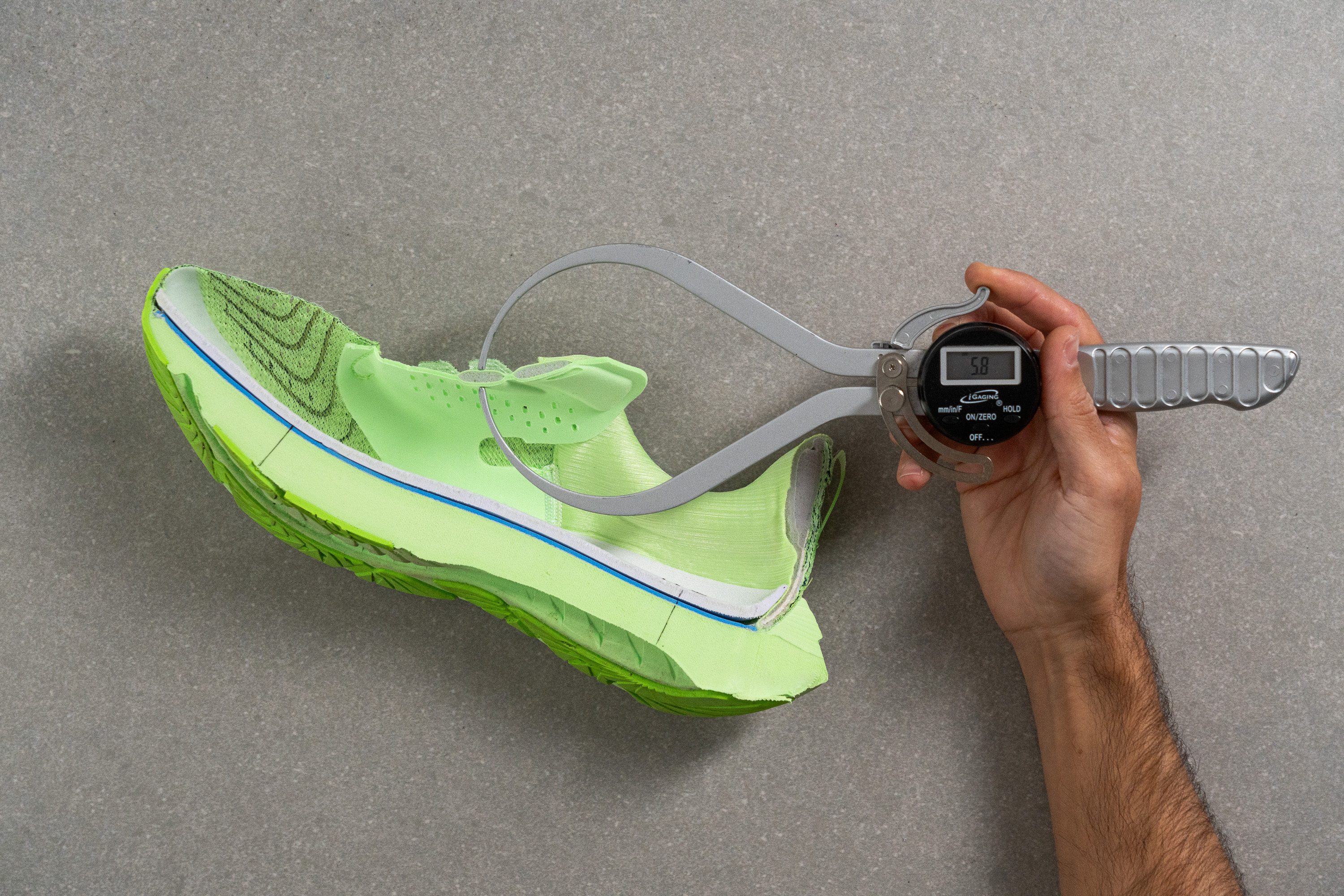
| Novablast 4 | 5.8 mm |
| Average | 5.7 mm |
Tongue: gusset type
This is yet another testament to the wisdom of not fixing what isn't broken.
The 4th edition of the Novablast still features a semi-gusseted tongue, which we believe is the best approach for achieving a balance between comfort and lightness, while ensuring a really good lockdown.
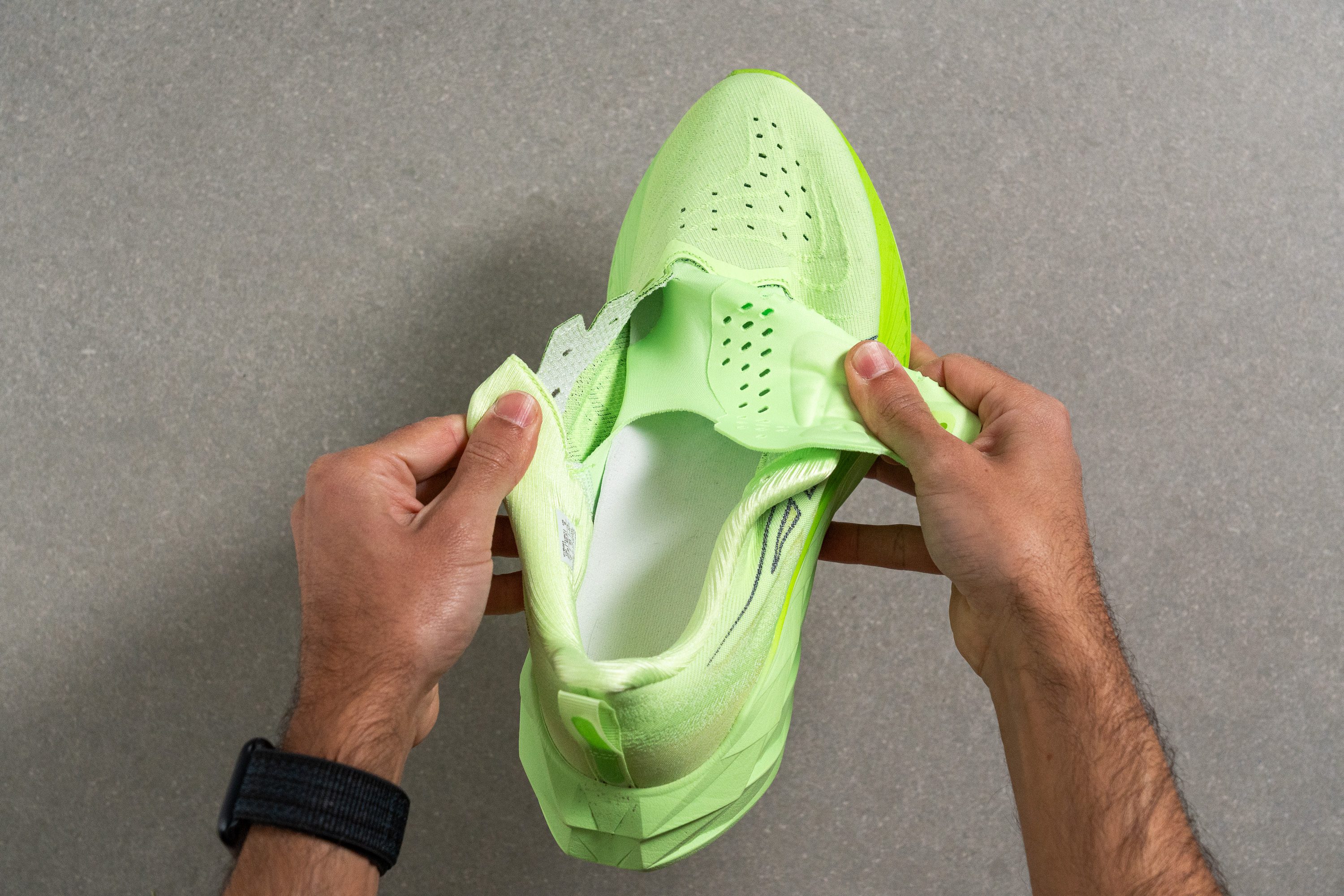
| Novablast 4 | Both sides (semi) |
Heel tab
The Novablast 3 didn't include a heel tab in its standard version—though it did in the LE variant that was released some months later—but this time, it's a welcome feature right from day one.
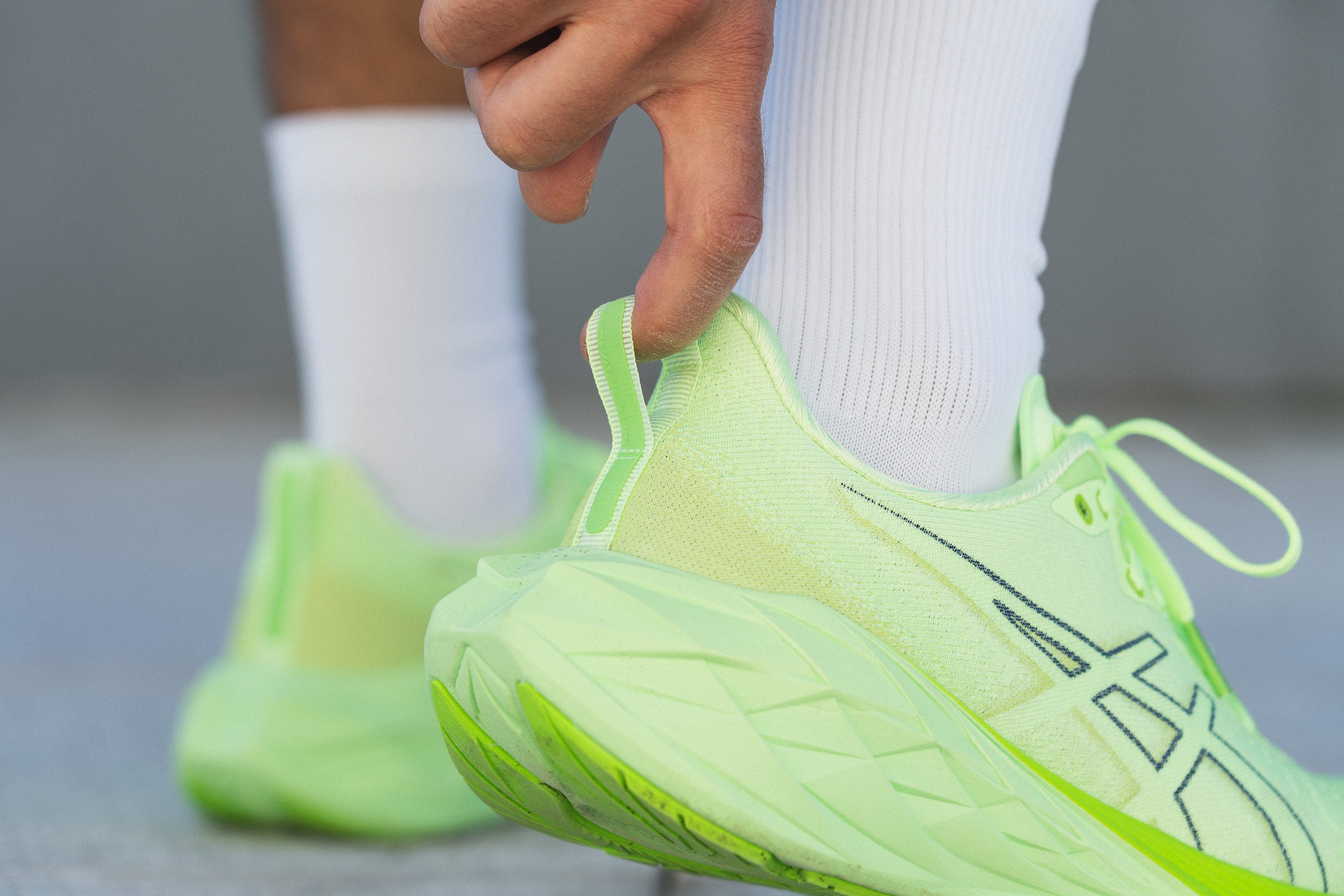
| Novablast 4 | Finger loop |

